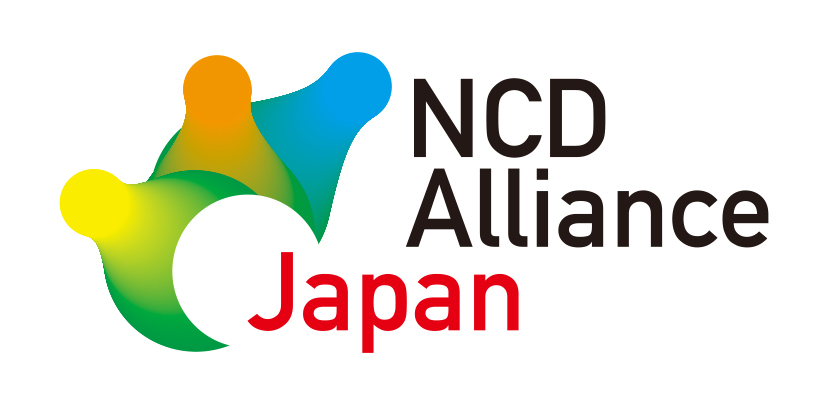Current Activities (January ― March 2023)
CONTENTS
- About Health and Global Policy Institute (HGPI)
- Top Global Health Policy Think Tanks 2020
- AMR: Antimicrobial Resistance
- NCDs: Non-Communicable Diseases
- Dementia
- Mental Health
- Child Health
- Women’s Health
- Global Health
- Future of the Healthcare System
- Non-partisan Diet Member study session
- Other Activities
- HGPI Seminar
- Lectures and Media Coverage
- Advocacy Activities to Encourage the Adoption of the Recommendations in Our Policy Proposals
- Providing Professional Expertise
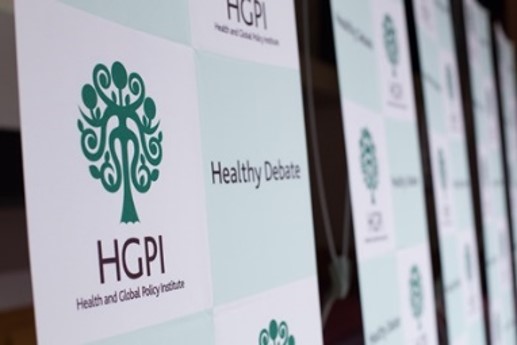
About Health and Global Policy Institute (HGPI)
Non-profit, Independent, and Global
Health and Global Policy Institute (HGPI) is a Tokyo-based independent and non-profit health policy think tank, established in 2004.
Since establishment, HGPI has pursued its mission of “Achieving citizen-centered health policies by bringing broad stakeholders together in its capacity as an independent think-tank to generate policy options for the public.” One of the Institute’s guiding principles in activities for this mission is to hold fast to its independence without adhering to the interests of any political party or organization. HGPI will continue to maintain political neutrality and independence from any organization in conducting its activities.
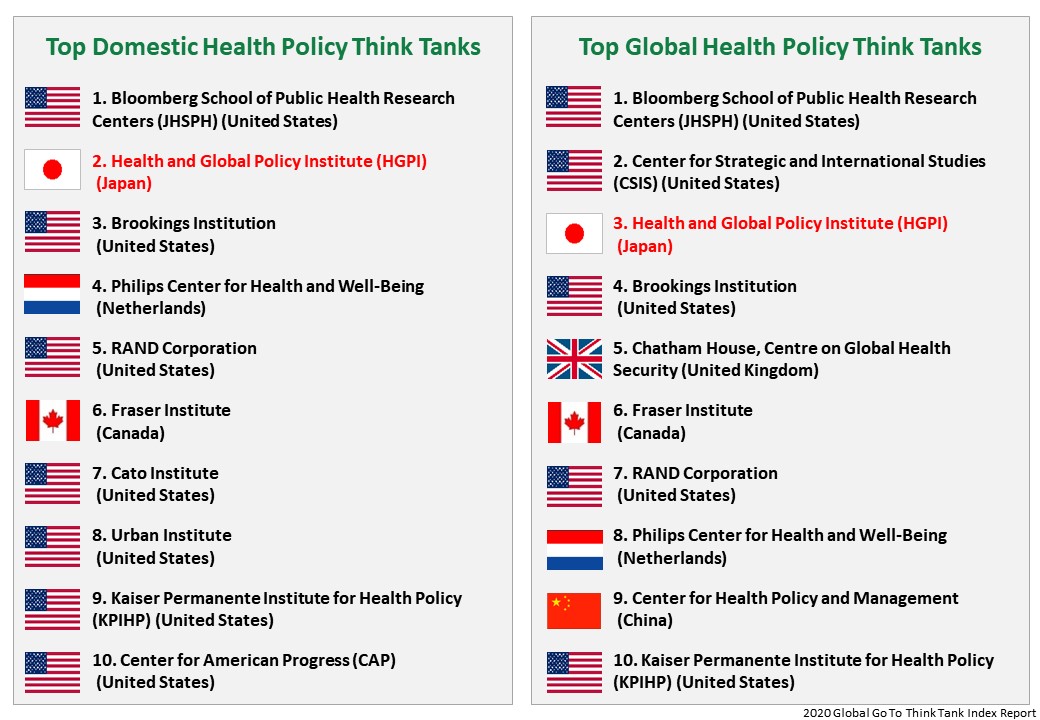
Top Global Health Policy Think Tanks 2020
Ranked Third in the World Among Global Health Policy Think Tanks
HGPI was ranked third among global health policy think tanks worldwide in University of Pennsylvania’s 2020 Global Go To Think Tank Index Report, published in January 2021. HGPI has been included in the ranking for twelve consecutive years, placing it among leading policy organizations.
“HGPI’s ranking is the result of its independence, the diversity of its funding sources, and its commitment to working globally by publishing all of its work in both English and Japanese. Encouraged by these results, we will double our efforts to continue to have a positive impact on society as a think tank specializing in health policy.” –HGPI Chairman Kiyoshi Kurokawa
“Especially during the pandemic, our work to advocate for citizens, patients, and healthcare workers is of the utmost importance. Now, more than ever, the world needs open and fair discussions on health policy. We will continue to foster such discussions, toward the creation of better policy ideas developed out of the combined knowledge of diverse stakeholders from the public and private sectors.” –HGPI CEO and Board Member Ryoji Noritake
AMR: Antimicrobial Resistance
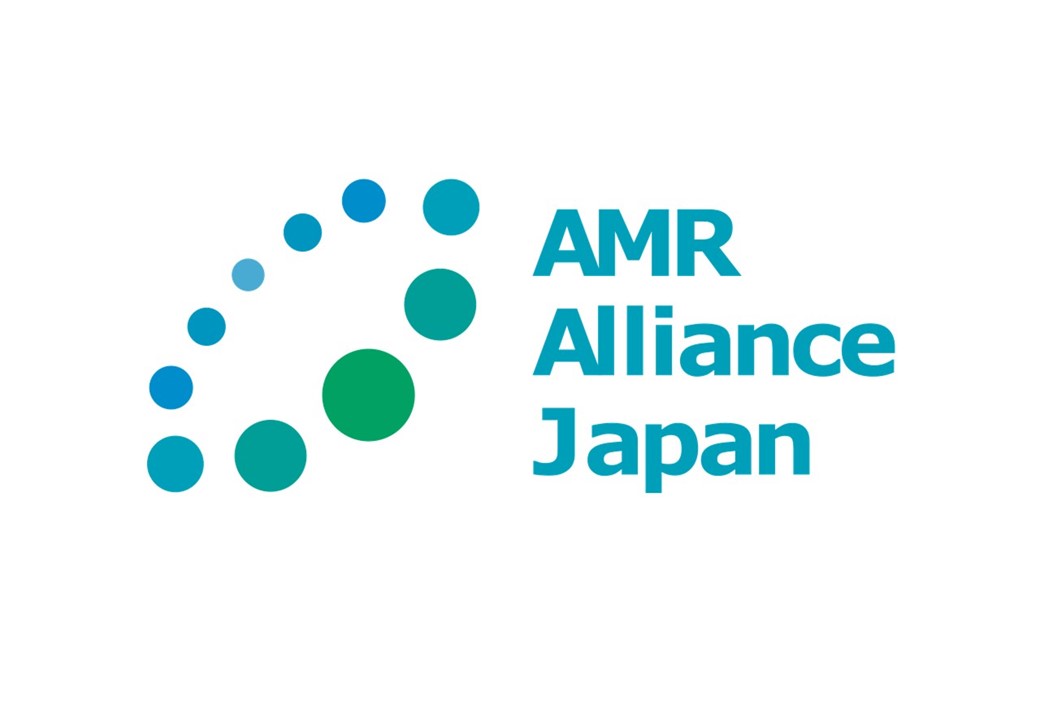
AMR Alliance Japan
Established in November 2018 by academic societies working in infectious disease medicine, pharmaceutical companies, and medical device makers, AMR Alliance Japan is an independent platform for the promotion of multisector discussion on AMR countermeasures. The Alliance develops and disseminates policy recommendations to: (1) ensure that AMR countermeasures are in line with the current situation of patients and healthcare settings; (2) promote the national and international AMR agenda; and (3) advance Japan’s AMR policy.
2023.03.31
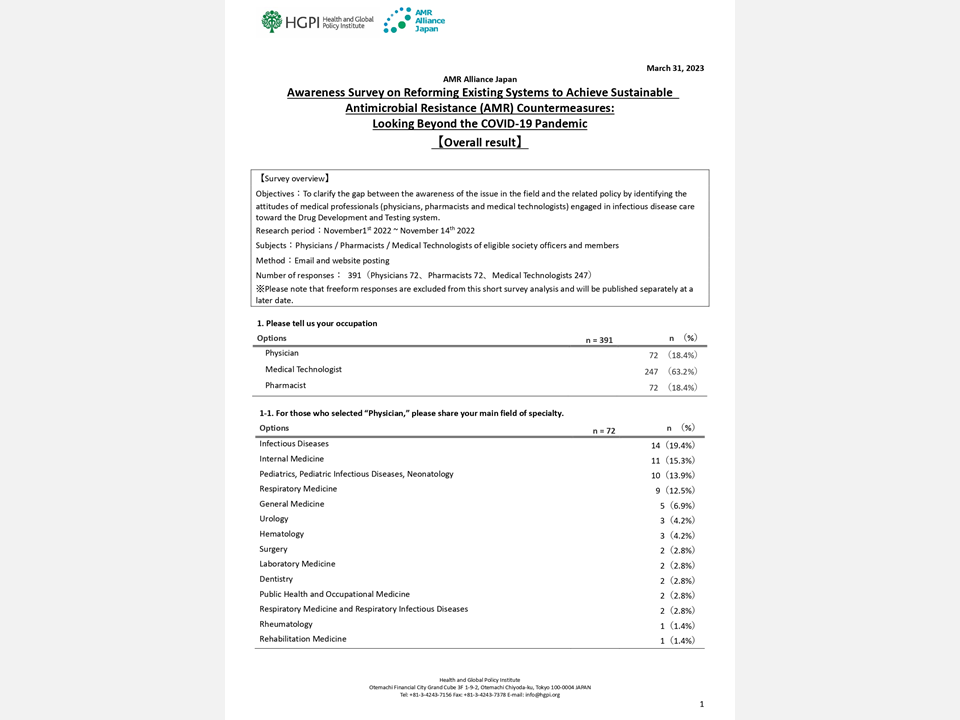
Research Report – Overall Results
Awareness Survey on Reforming Existing Systems to Achieve Sustainable Antimicrobial Resistance (AMR) Countermeasures: Looking Beyond the COVID-19 Pandemic
In cooperation with seven academic societies related to infectious diseases (The Joint Review Committee of Seven Academic Societies for the Promotion of Infectious Disease Therapy and Drug Discovery and Japanese Association of Medical Technologists), AMR Alliance Japan (Secretariat: HGPI) has conducted a survey on the awareness of drug development and testing within AMR countermeasures among members of the aforementioned societies, including physicians, pharmacists, and Medical Technologists.
2023.03.16
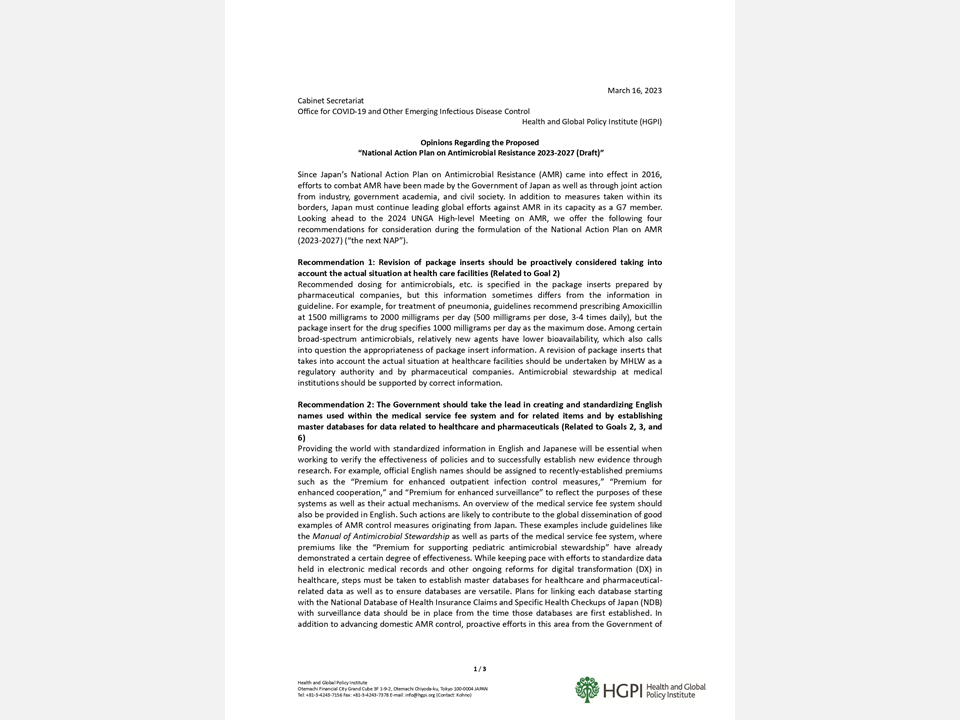 Public Comment Submission
Public Comment Submission
“National Action Plan on Antimicrobial Resistance 2023-2027 (Draft)”
HGPI submitted opinions (public comments) regarding “National Action Plan on Antimicrobial Resistance 2023-2027 (Draft)”.
Summary
Since Japan’s National Action Plan on Antimicrobial Resistance (AMR) came into effect in 2016, efforts to combat AMR have been made by the Government of Japan as well as through joint action from industry, government academia, and civil society. In addition to measures taken within its borders, Japan must continue leading global efforts against AMR in its capacity as a G7 member. Looking ahead to the 2024 UNGA High-level Meeting on AMR, we offer the following four recommendations for consideration during the formulation of the National Action Plan on AMR (2023-2027) (“the next NAP”).
Recommendation 1: Revision of package inserts should be proactively considered taking into account the actual situation at health care facilities (Related to Goal 2)
Recommendation 2: The Government should take the lead in creating and standardizing English names used within the medical service fee system and for related items and by establishing master databases for data related to healthcare and pharmaceuticals (Related to Goals 2, 3, and 6)
Recommendation 3: Steps should be taken to develop human resources and establish an environment to facilitate proactive AMR screening, microorganism identification, and drug susceptibility testing (including genetic testing through nucleic acid amplification tests) (Related to Goals 1, 2, and 5)
Recommendation 4: When providing final evaluations, the National Action Plan should include both outcome and process indicators that can used in a manner that allows for comparisons by regional characteristics (Related to National Action Plan performance indicators)
2023.02.28
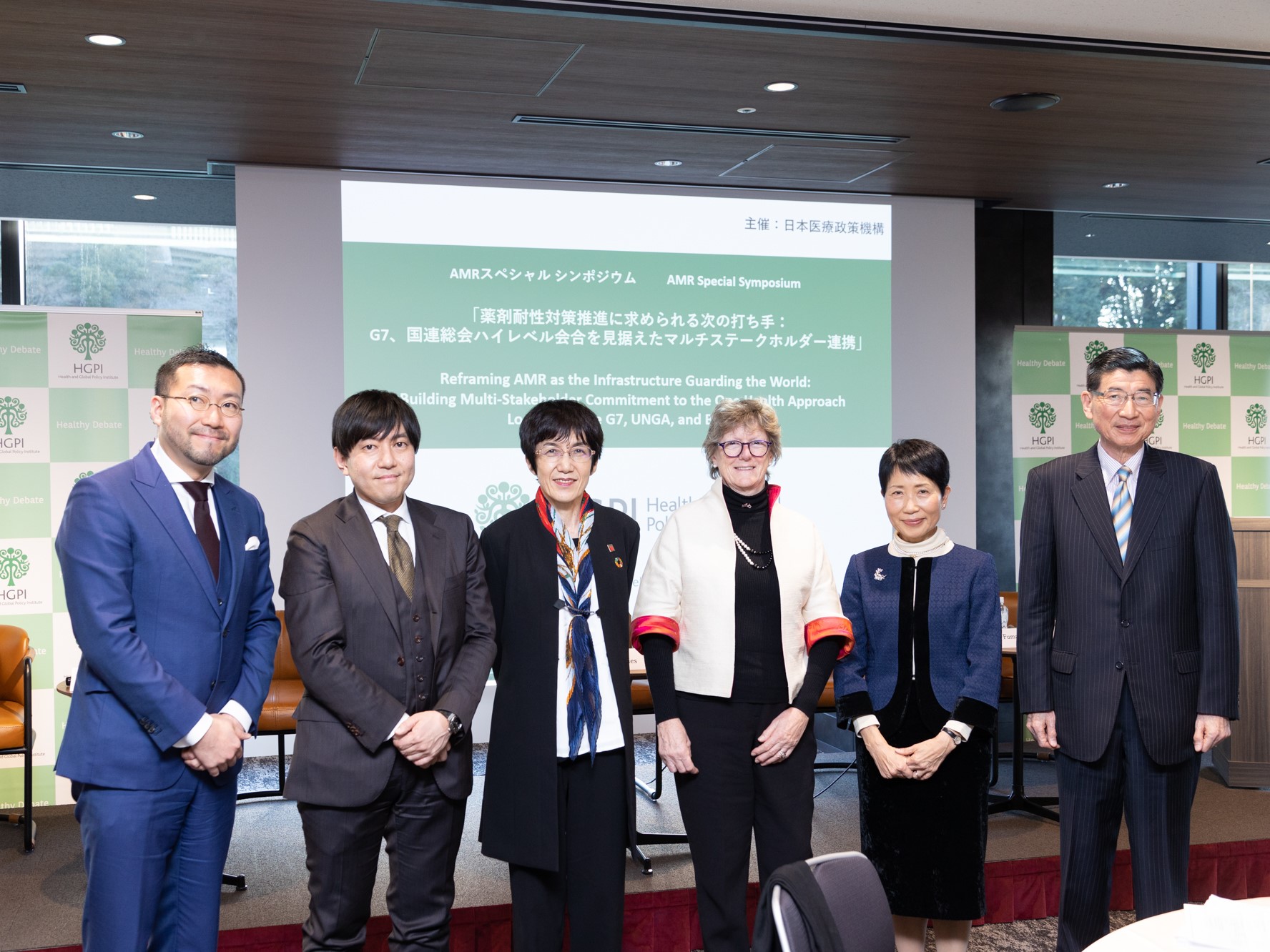
AMR Special Symposium
Reframing AMR as the Infrastructure Guarding the World: Building Multi-Stakeholder Commitment to the One Health Approach Looking to the G7, UNGA, and Beyond
This symposium aimed to bring together stakeholders from various fields related to AMR to examine the ways in which society should collaborate, including discussions on what each sector can do to further AMR countermeasures towards the G7 Summit, the UN General Assembly (UNGA) and beyond. The voice of AMR patient was also shared with participants at the symposium.
Participants
Dame Sally Davies(UK Government Special Envoy on Antimicrobial Resistance)
Takuko Sawada(Director and Vice Chairperson of the Board, Shionogi & Co., Ltd.)
Kenji Fuma(CEO, Neural, Inc. / Specially Appointed Professor, Shinshu University)
Naoko Ishii(Executive Vice President, the University of Tokyo / Director, Center for Global Commons/ Professor, Institute for Future Initiatives / Member, Global Preparedness Monitoring Board (GPMB))
Junichi Maruyama(Previous Ambassador of Japan to Serbia)
2023.02.23-02.22
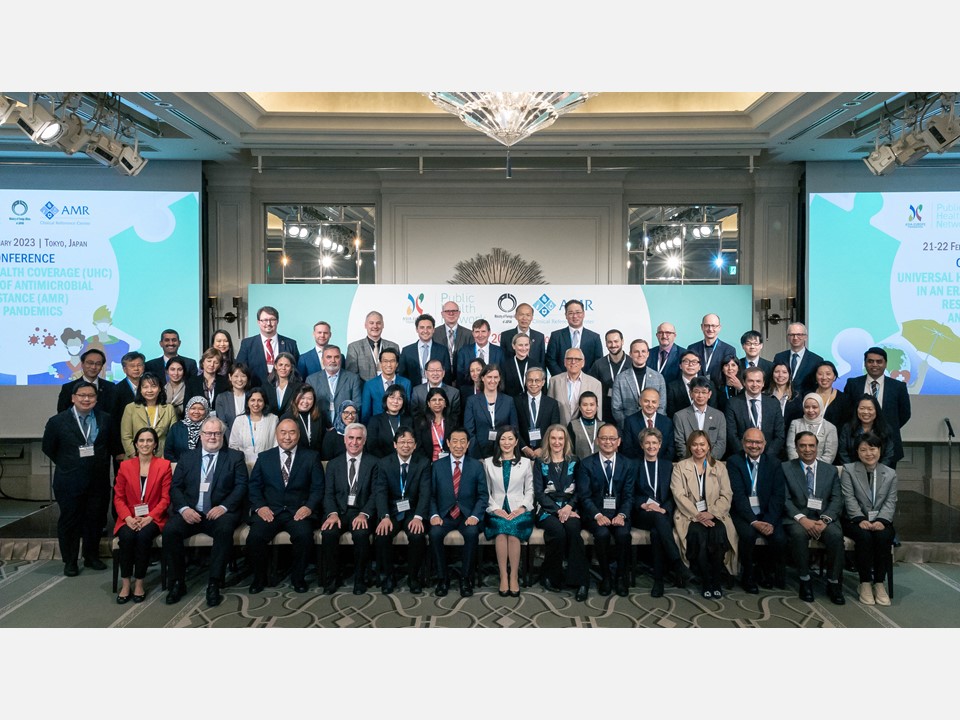
Universal Health Coverage (UHC) in an Era of Antimicrobial Resistance (AMR) and Pandemics
HGPI Manager Ms. Yui Kohno attended a high-level conference on “Universal Health Coverage (UHC) in an Era of Antimicrobial Resistance (AMR) and Pandemics” in Tokyo. This conference was hosted by the Asia-Europe Foundation (ASEF) and co-hosted by the Ministry of Foreign Affairs and the AMR Clinical Reference Center.
2023.02.02

FY2023 AMR Alliance Japan Planning Meeting
AMR Alliance Japan, as an independent platform for multisector discussion with the mission of contributing to the improvement of public health by promoting measures on AMR, will continue to work with Alliance members and partner organizations to deepen policy debate around AMR.
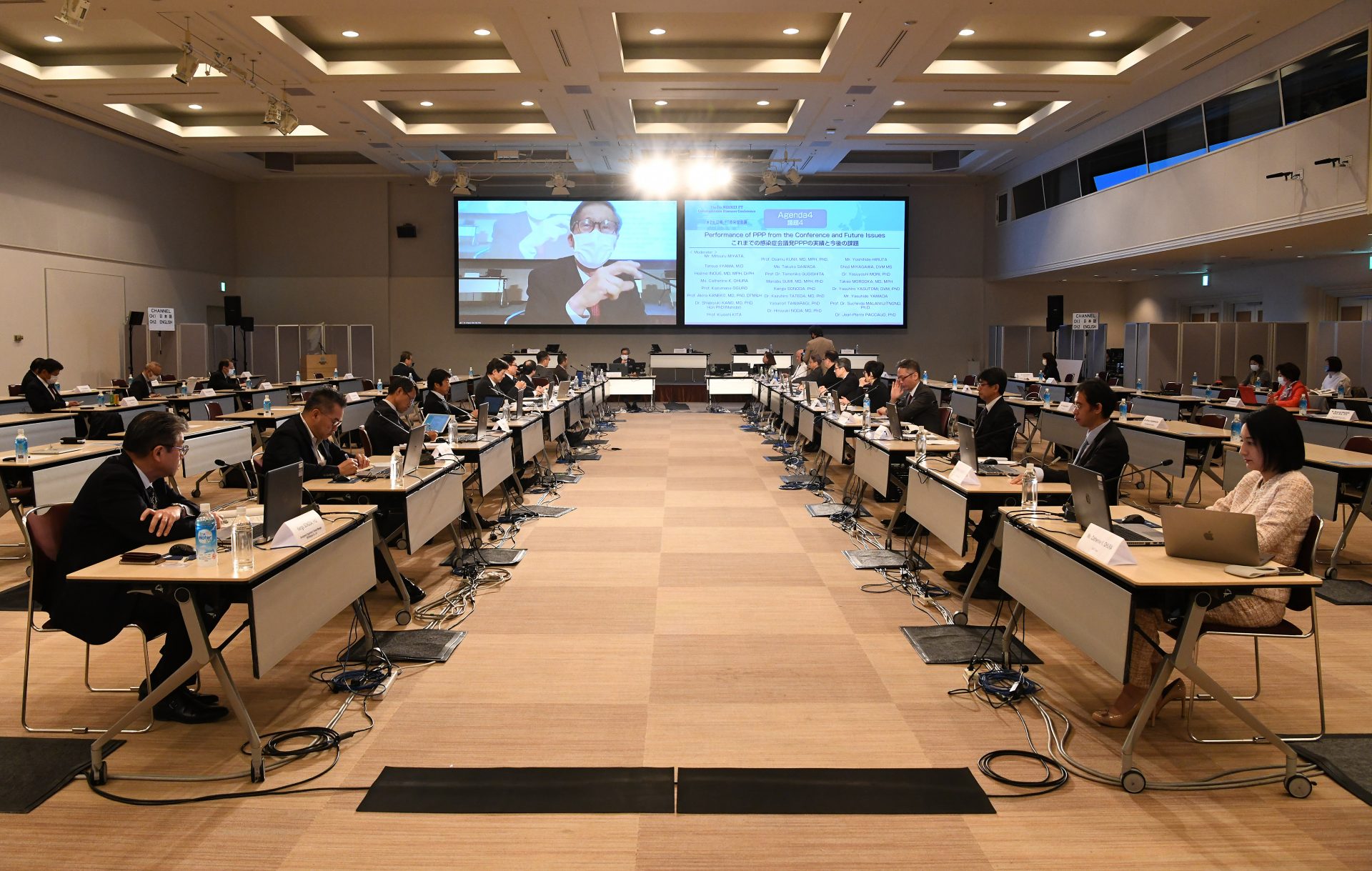
The AMR Consortium of the Nikkei FT Communicable Diseases Conference – Asia Africa Medical Innovation Consortium (AMIC)
The Asia Africa Medical Innovation Consortium (AMIC) was jointly hosted by Nikkei Inc. and AMR Alliance Japan. The two basic pillars of the AMIC AMR, “Considering Specific Pull Incentives and Measures” and “Promoting Understanding of AMR Among Healthcare Professionals and the General Public,” were discussed by working groups.
2023.03.09
The 8th Meeting
AMR Alliance Japan (Secretariat: HGPI) held the Eighth Meeting of the AMR Consortium of the Nikkei FT Communicable Diseases Conference Asia Africa Medical Innovation Consortium (AMIC).
NCDs: Non-Communicable Diseases
NCD Alliance Japan
NCD Alliance Japan is a collaborative platform for civil society organizations in the NCD community steered by the Health and Global Policy Institute. Its aim is to further promote comprehensive, cross-cutting NCD policies. Since 2013, NCD Alliance Japan has served as Japan’s point-of-contact for the NCD Alliance, which brings together over 2,000 civil society organizations and academic institutions in more than 170 countries. NCD Alliance Japan was officially recognized as a full member of the NCD Alliance in January 2019.
2023.03.31
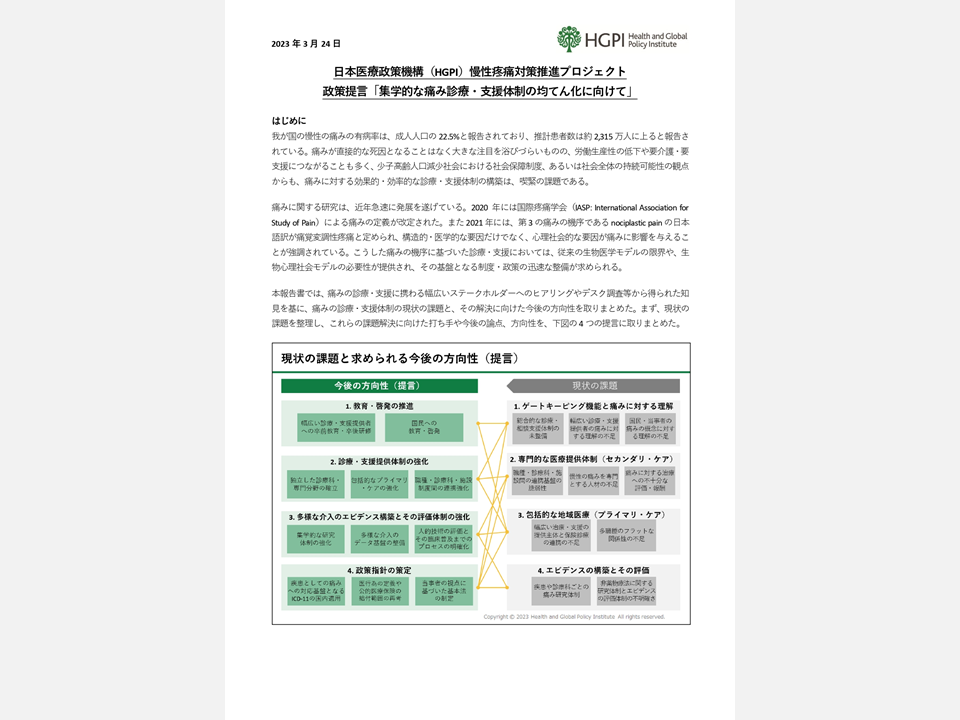
The Project for Chronic Pain Measures Policy Recommendations
Achieving Equity in Multidisciplinary Pain Treatment and Support Systems for Pain Management
The Project for Chronic Pain Measures has presented policy recommendations. These recommendations are based on findings from desk studies and interviews with people living with chronic pain, healthcare providers, academia, and specialists in related fields.
Hearing participants
Mariko Asaeda (Vice-Representative Director, the Goodbye Pain Patient Support Organization for Intractable Neuropathic Pain)
Masako Ikawa (Dental Surgeon, Department of Oral Surgery, Shizuoka City Shimizu Hospital)
Masako Iseki (Professor, Department of Anesthesiology and Pain Medicine, Juntendo University Faculty of Medicine)
Takahiro Ushida (Director and Professor, Multidisciplinary Pain Center and Institute of Physical Fitness, Sports Medicine and Rehabilitation, Aichi Medical University)
Fusao Kato (Director, Jikei Center for Neuroscience of Pain, The Jikei University School of Medicine)
Masaki Kitahara (Clinical Professor, Pain Clinic, Yokohama City University Medical Center)
Hironori Kuga (Director, National Center for Cognitive Behavior Therapy and Research, National Center of Neurology and Psychiatry)
Eriko Satomi (Chief, Department of Palliative Medicine, National Cancer Center Hospital)
Yumika Shirase (Professor, Graduate School of Social Sciences, Hitotsubashi University)
Takuya Numasawa (Director, Department of Orthopedic Surgery, Hachinohe City Hospital)>
Sei Fukui >(Clinical Professor, Pain Management Clinic, Shiga University of Medical Science Hospital)
Takako Matsubara (Professor, Graduate School of Rehabilitation, Kobe Gakuin University)
Koji Mori (Professor, Department of Occupational Health Practice and Management, University of Occupational and Environmental Health, Japan)
Shoji Yabuki (Professor, Endowed Chair, Department of Pain Medicine, Fukushima Medical University)
Kazuho Wakazono (Representative Director, the Goodbye Pain Patient Support Organization for Intractable Neuropathic Pain)
2023.03.31
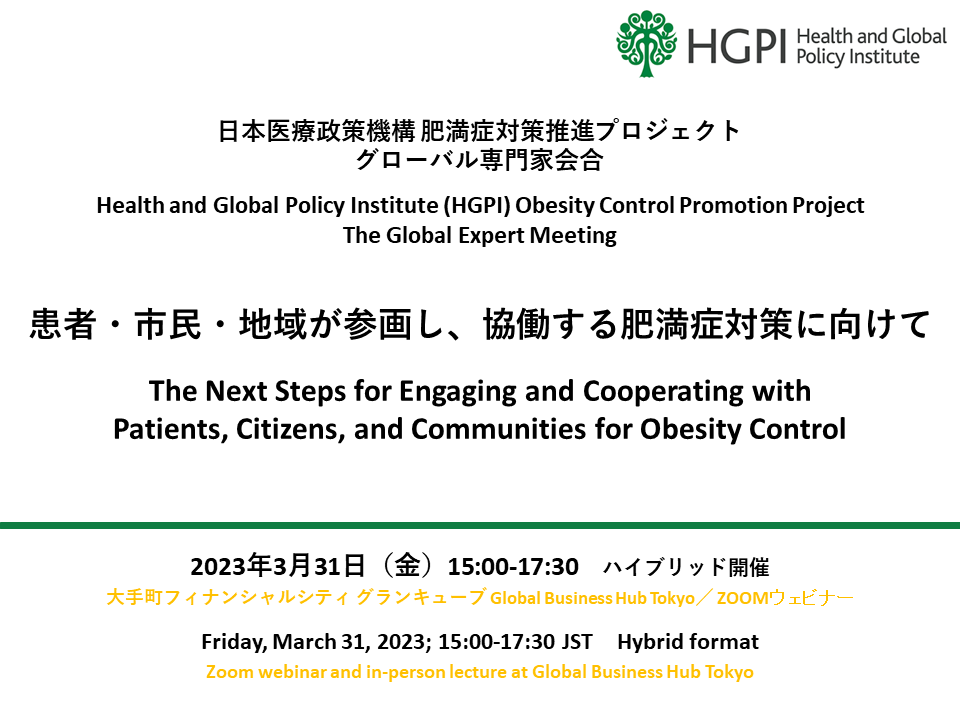
The Obesity Control Promotion Project Global Expert Meeting
The Next Steps for Engaging and Cooperating with Patients, Citizens, and Communities for Obesity Control
HGPI launched the Obesity Control Promotion Project in 2022 with the objectives of heightening interest in general obesity and obesity requiring medical intervention throughout society and building momentum for more effective, organic measures for obesity control. This symposium aimed to discuss with multi-stakeholder groups in Japan and overseas the current issues raised in the described discussion points, the future prospects for combating obesity, and the next steps to be taken, and to disseminate these to society at large. In addition, the discussion has been deepened by presenting best practices and lessons learned in Europe.
2023.03.15
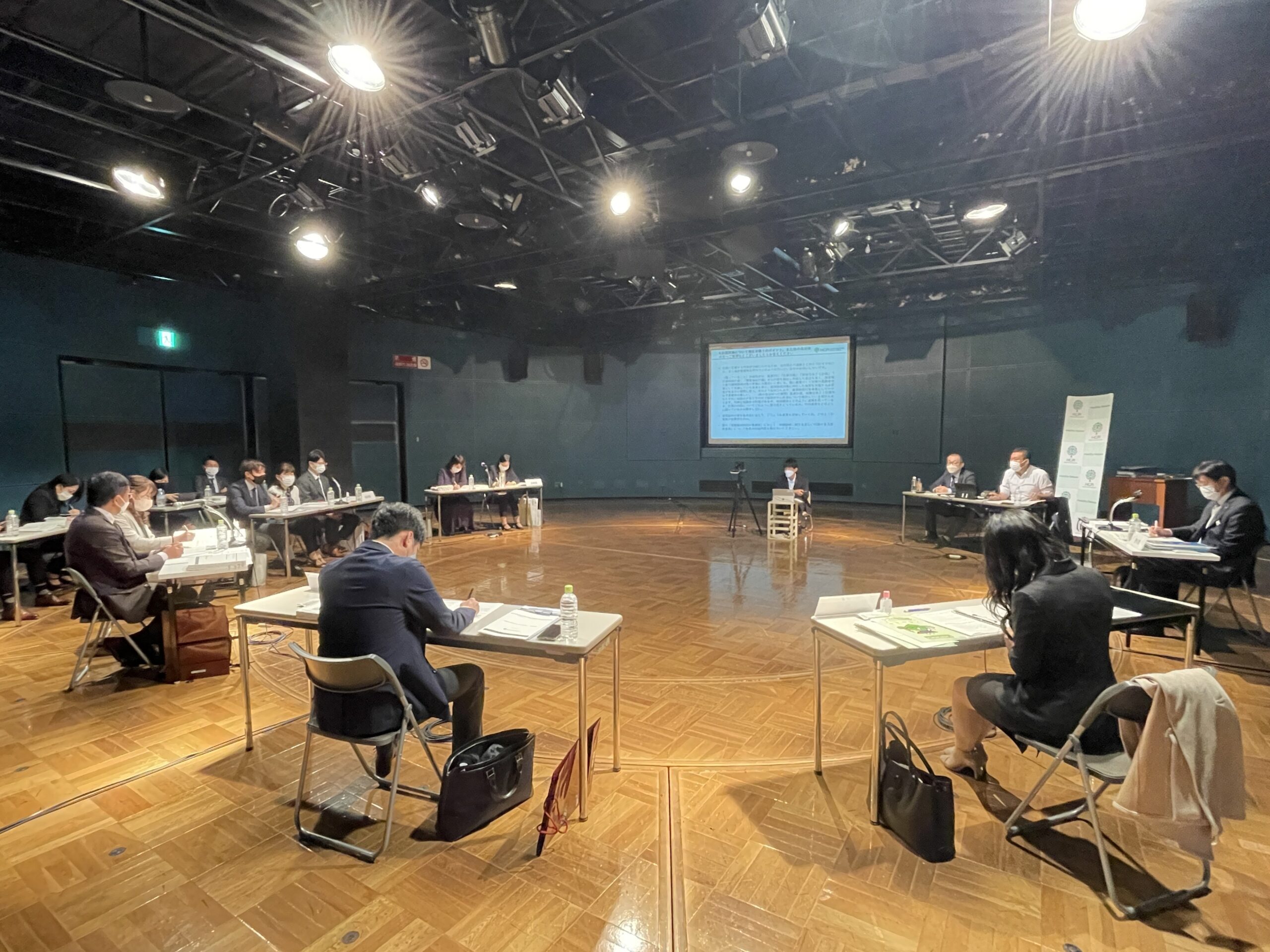 The Cardiovascular Disease Control Promotion Project
The Cardiovascular Disease Control Promotion Project
The Kyushu-Shikoku Summit on Promoting Measures for CVD Control
Current Issues and Prospects for Advancing Cardiovascular Disease Control Promotion Plans in Each Prefecture
HGPI hosted the Kyushu-Shikoku Summit on Promoting Measures for Cardiovascular Disease (CVD) Control as our first meeting to advance CVD control measures that leverage the unique aspects of each region and to share lessons and good examples accumulated in each municipality. HGPI has crystallized the discussion points related to topics that were shared at the Summit as well as their future prospects.
Discussion Points
- Discussion point 1: Although all prefectural governments have been obligated to formulate and implement Plans for Promotion of Measures Against Cerebrovascular and Cardiovascular Disease (hereinafter, “CVD Control Plans”), they must also formulate many other plans regarding health and medical care. This is causing challenges when making each CVD Control Plan unique and consistent with other plans.
- Discussion point 2: Each prefecture is examining and formulating CVD Control Plans utilizing logic models, and the final outcomes of those logic models as well as indicators and other items for evaluating them must be fine-tuned to ensure they are tailored to each prefecture’s issues.
- Discussion point 3: Issues that have been identified for proactively implementing the national Government’s Model Projects for Integrated Centers for Stroke and Heart Disease Support (hereinafter, “model projects”) in each prefecture include understanding and collaboration among health institutions, university hospitals, and other institutions that will work together with prefectural governments. Another issue is securing and developing human resources needed for collaboration between the public sector, academia, and the health sector. Model projects that promote collaboration between these three sectors in each prefecture must be designed.
- Discussion Point 4: The national Government’s model projects are useful for ensuring equity in CVD control measures and some prefectures are now discussing funding their own successor projects to continue them. Those successor projects will require sufficient funding from the national Government over multiple years.
- Discussion Point 5: As each prefecture moves forward on implementing its CVD Control Plan, there have been cases in which agreements to collaborate with private companies have been formed. The lack of criteria for selecting private companies to collaborate with may become an issue.
- Discussion Point 6: After each prefecture formulates its CVD Control Plan, it will be necessary for various departments at each prefectural government to advance a wide range of initiatives over time, so monitoring and evaluating internal progress may become a challenge.
- Discussion Point 7: To promote patient and public involvement (PPI) in the field of CVDs, it will be necessary to grasp circumstances surrounding CVD patient advocacy organizations in each prefecture while providing sufficient information to patients and other affected parties so they can actively participate in discussions on CVD Control Plans.
- Discussion Point 8: A platform that enables each prefecture to cross reference its initiatives with those of other prefectures must be established.
2023.02.18
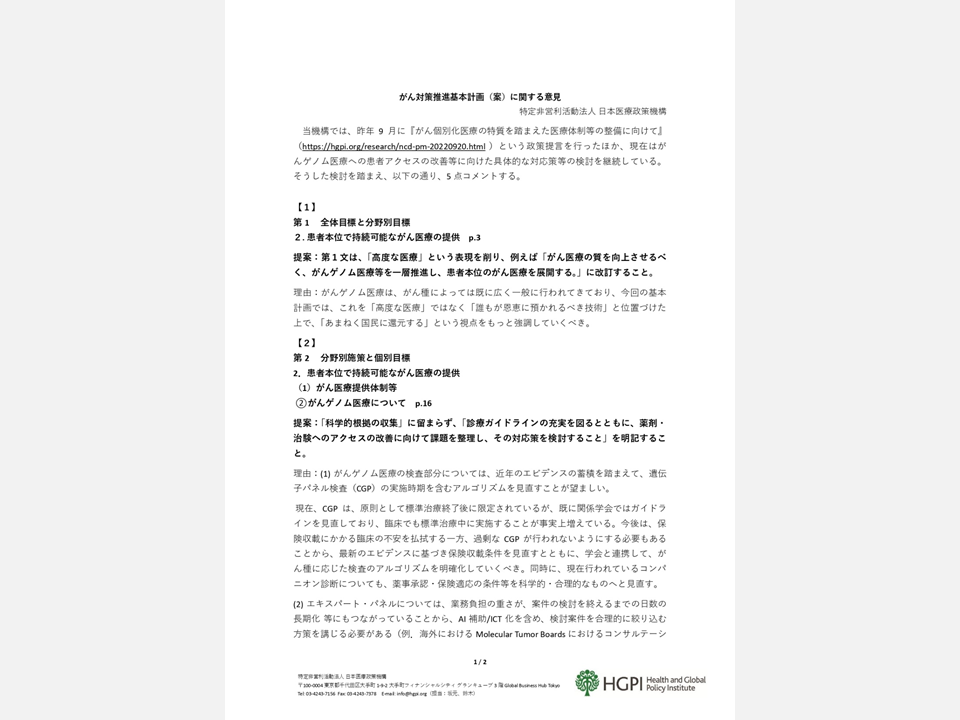 Public Comment Submission
Public Comment Submission
“Basic Plan for the Promotion of Cancer Control (Draft)”
HGPI has submitted opinions (public comments) on “Basic Plan for the Promotion of Cancer Control (Draft)”to the Health Bureau of the Ministry of Health, Labour and Welfare (MHLW).
Summary of our public comments
- Recommendation 1: Genomic cancer medicine is already widely used in some types of cancer. Therefore, this should be positioned as a technology that everyone should be able to benefit from, rather than an advanced medical treatment as described in the Draft.
- Recommendation 2: As for the measures to be taken in genomic cancer medicine, one should not only focus on gathering scientific evidence, but should also emphasize to enhance medical practice guidelines, and to identify the issues and consider measures to improve access to drugs and clinical trials.
- Recommendation 3: Describe Decentralized Clinical Trials (DCTs) as one of the measures for prompt healthcare implementation, in order to provide patient-oriented and sustainable cancer care.
- Recommendation 4: In order to strengthen human resource development as a foundation to support genome cancer medicine, one should establish and strengthen cooperative relationships among hospitals with respect to specialist personnel, in addition to developing and assigning specialist personnel within the organization respectively.
- Recommendation 5: In cancer education and promotion of cancer knowledge, one should mention genome cancer medicine in addition to cancer in general.
Dementia
2023.03.31
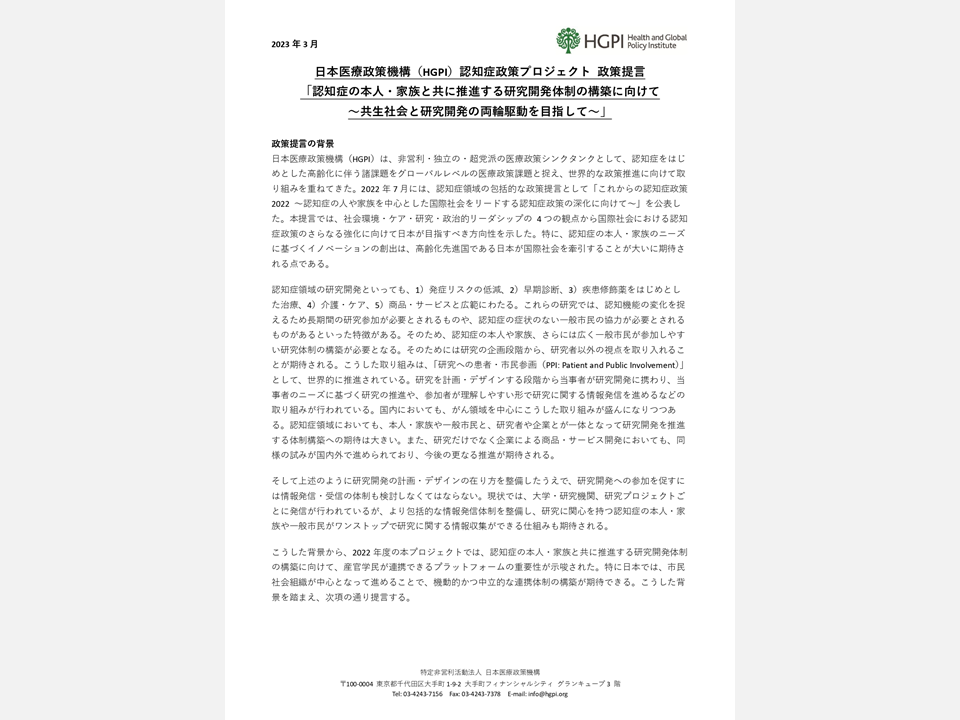
Policy Recommendations
Building a Research and Development System Together With People Living with Dementia and Their Families to Drive Parallel Progress in Creating an Inclusive Society and Advancing R&D
The recommendations were complied by HGPI independently based on discussions of Roundtable Discussions and Symposium we held this year.
Overview
Recommendations:
To achieve innovations in dementia that are based on the needs of people living with dementia, their families, and citizens, a collaborative platform centered on civil society should be established.
Anticipated features for the collaborative platform:
- Features that promote Patient and Public Involvement (PPI) and PPI-centered development
- Features that provide suitable support and easy access to information regarding research programs to all participants
- “Participant first” and “Family first” features that provide access to care through research program participation
- Features that enable two-way feedback among participants and researchers after research programs are concluded and that create communities that last
- Features that allow opinions on and evaluations of innovations that have been introduced to be accumulated and utilized to contribute to further improvements
2023.03.17
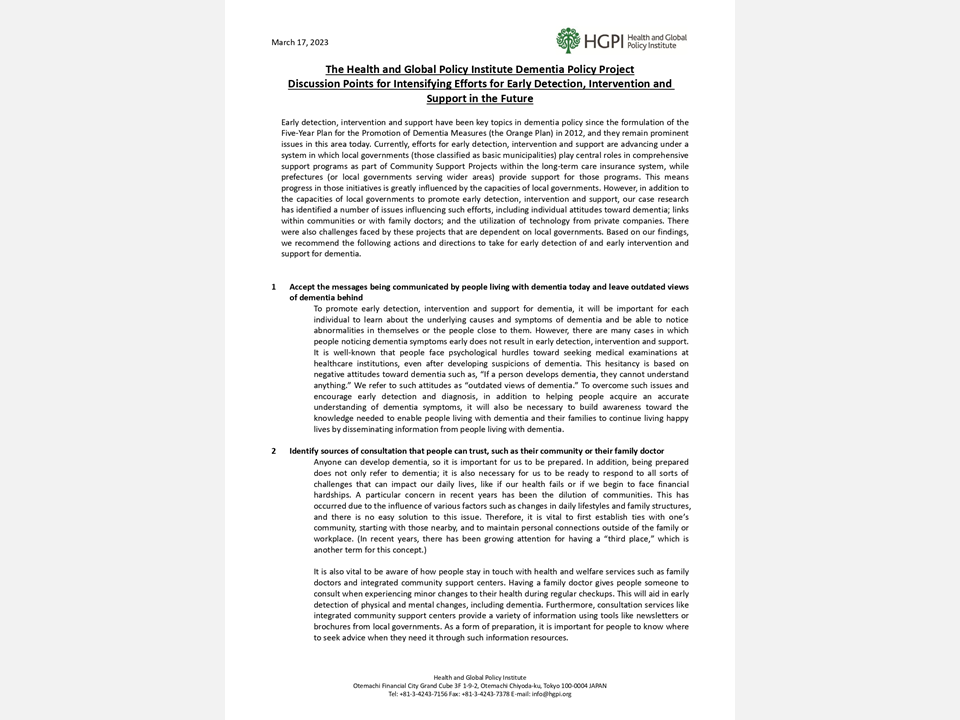
Publication, Policy Recommendations
Best Practices in Promoting Early Dementia Detection, Intervention and Support
Discussion Points for Intensifying Efforts for Early Detection, Intervention and Support for Dementia in the Future
HGPI held hearings with stakeholders engaged in a number of groundbreaking initiatives for the further advancement of early detection, intervention and support, and presented best practices. The compilation is accompanied by policy. These recommendations are based on hearings with related parties that were held to accumulate the aforementioned best practices as well as on past discussions held for this project.
Overview
- Accept the messages being communicated by people living with dementia today and leave outdated views of dementia behind
- Identify sources of consultation that people can trust, such as their community or their family doctor
- Engage in collaboration spanning Government, civil society, and the parties most affected that aims to implement the use of digital technologies and other new solutions from the private sector
- Make consultation services at local governments one-stop solutions and reinforce collaborative systems to enable those services to be able to respond to diversified consultation needs
- Build a unified support system that spans the period from when people first notice the signs of dementia to before and after diagnosis
- Redefining “Initial-phase Intensive Support Teams for Dementia,” the heart of unified support
- Positioning community dementia support promoters as coordinators of diverse community resources
- Disseminating peer support and improving its quality
2023.02.16
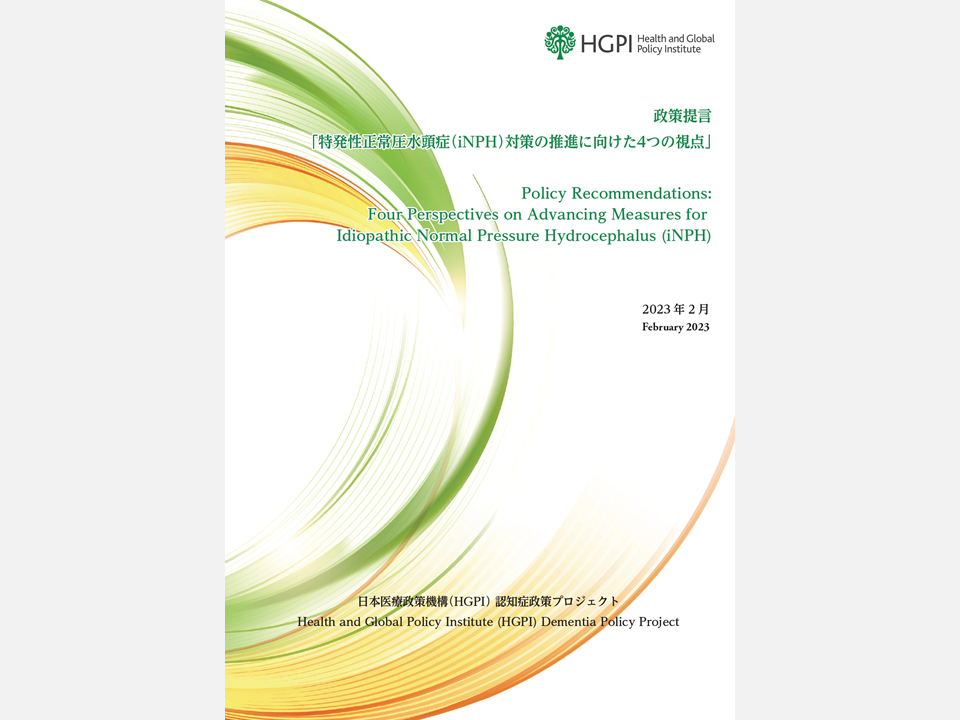
Policy Recommendations
Four Perspectives on Advancing Measures for Idiopathic Normal Pressure Hydrocephalus (iNPH)
HGPI has positioned iNPH as a key item on its agenda for dementia policy and has engaged with various parties related to iNPH including health professionals, representatives of academia and industry, and the parties most affected for multi-stakeholder discussions with industry, Government, academia, and civil society. Based on those discussions, we have formulated the following policy recommendations regarding necessary measures for iNPH with the objective of resolving the diverse issues described above with an all-of-society response.
Overview
Perspective 1: Promoting measures to enhance multi-stakeholder awareness during each phase
- The need to provide information on iNPH and to broadly and actively disseminate treatment guidelines across medical departments
- The need to expand the scope of awareness campaigns to target long-term care professionals, welfare professionals, and private businesses that support elderly people in their everyday lives
- The need to train patient advocate leaders and provide support that energizes activities from civil society organizations, starting with patient advocacy organizations
Perspective 2: Building a healthcare provision system that achieves early intervention and high-quality diagnosis and treatment
- The need to establish pathways from initial observations to medical consultations to enhance early detection, diagnosis, and response
- The need to establish centers for iNPH diagnosis and treatment that are compatible with the characteristics of each community
- The need to strengthen collaboration that spans hospitals, clinics, and multiple medical and long-term care professions to establish seamless postoperative follow-up systems
Perspective 3: Establishing a sustainable and innovative research environment that can respond to diverse needs
- The need to secure continuous funding and to drive growth in domestic iNPH research over the medium to long term
- The need to promote AI utilization, interdisciplinary joint research, international data sharing, and patient and public involvement (PPI) in research
Perspective 4: Exercising political leadership to ensure necessary measures are implemented in a stable and reliable manner
- The need to mention iNPH in national strategies, starting with the National Framework for Promotion of Dementia Policies
- The need to raise awareness toward iNPH in the legislature and to demonstrate leadership to advance future policies
2023.02.02
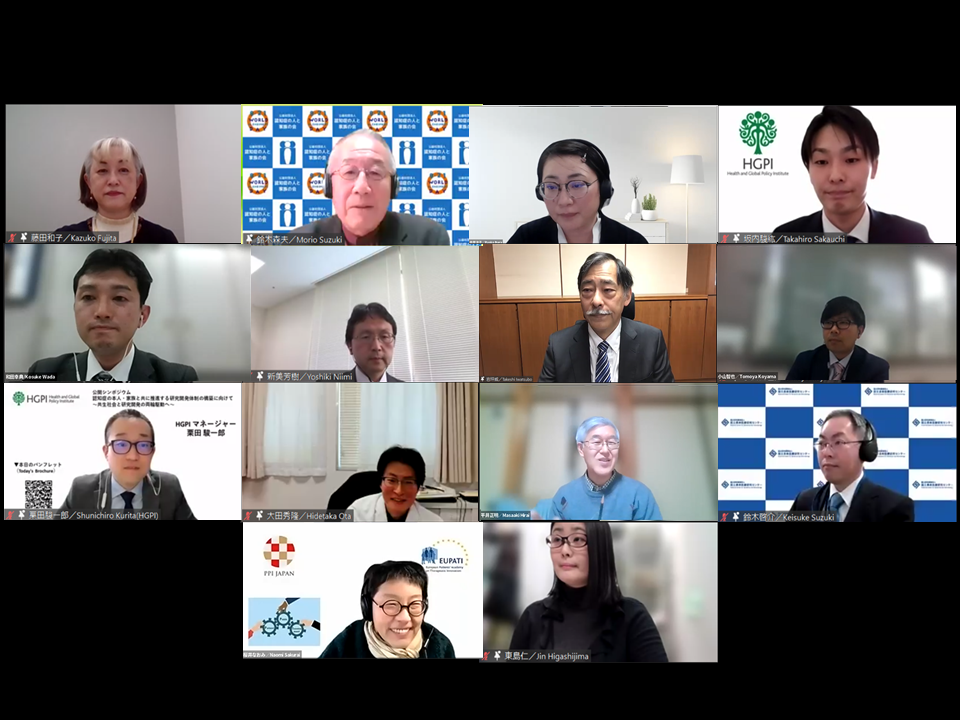
Symposium
Building an R&D System Together with People Living With Dementia and Their Families – Driving Parallel Progress on an Inclusive Society and in R&D~
HGPI co-hosted the symposium with the Japan Dementia International Exchange Platform (Alzheimer’s Association Japan), PPI Japan and Kiitemiru,Kangaetemiru!?.
Participants
Takeshi Iwatsubo (Professor, Department of Basic Neuroscience, Department of Neurology, Graduate School of Medicine, The University of Tokyo; Director, Unit for Early and Exploratory Clinical Development, The University of Tokyo Hospital)
Ryoko Ihara (Chief Physician, Department of Neurology, Tokyo Metropolitan Geriatric Medical Center Hospital)
Yoshiki Niimi (Special Appointed Lecturer, The University of Tokyo Hospital)
Hidetaka Ohta (Professor and Director, Advanced Research Center for Geriatric and Gerontology, Akita University)
Kazuko Fujita (Representative Director, Japan Dementia Working Group)
Morio Suzuki (Representative Director, Alzheimer’s Association Japan (AAJ))
Jin Higashijima (Associate Professor, Graduate School of Global and Transdisciplinary Studies, Chiba University)
Masaaki Hirai (Representative, Mahoroba Club)
Tomoya Koyama (Deputy Director, Healthcare Industries Division, Commerce and Service Industry Policy Group, Ministry of Economy, Trade and Industry (METI))
Naomi Sakurai (President, Cancer Solutions Co., Ltd.)
Keisuke Suzuki (Director, Innovation Center for Translational Research, National Center for Geriatrics and Gerontology)
Kousuke Wada (Director for Dementia Strategy, Division of Dementia Policy and Community-Based Long-Term Care Promotion, Health and Welfare Bureau for the Elderly, Ministry of Health, Labour and Welfare (MHLW))
2023.01.31
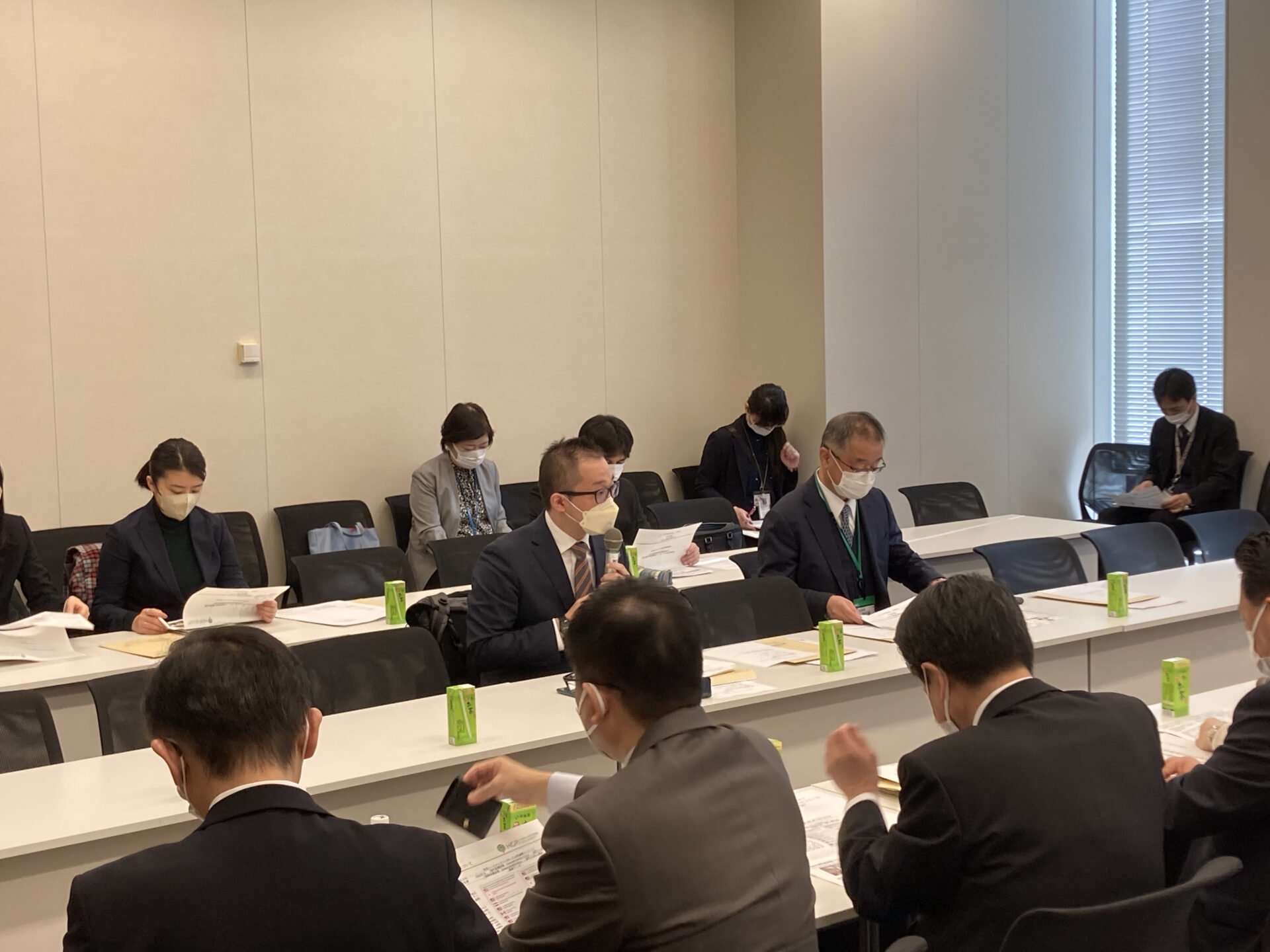
Joint Meeting of Komeito Headquarters for the Promotion of Policies for Dementia Care and Health, Labour and Welfare Subcommittee
Hearing on Policy Requests and Question and Answer Session
HGPI Manager Mr. Shunichiro Kurita participated in a joint meeting of the Komeito Headquarters for the Promotion of Policies for Dementia Care and the Health, Labour and Welfare Subcommittee during their hearing on policy requests and question and answer session.
2023.01.24
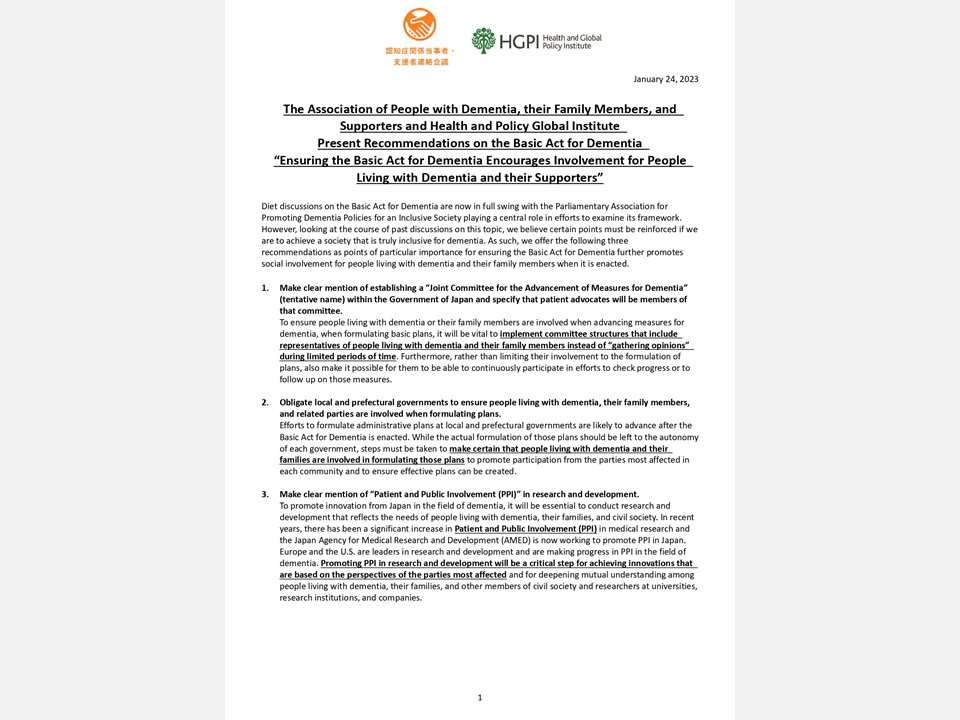
The Association of People with Dementia, their Family Members, and Supporters and HGPI Present Recommendations
Ensuring the Basic Act for Dementia Encourages Involvement for People Living with Dementia and their Supporters
HGPI) Dementia Policy Project has presented follow-up recommendations regarding the Basic Act for Dementia titled, “Ensuring the Basic Act for Dementia Encourages Involvement for People Living with Dementia and their Supporters.” These follow-up recommendations were formulated in cooperation with the Association of People with Dementia, their Family Members, and Supporters.
The following recommendations are meant to emphasize key points that were already described in urgent recommendations presented by HGPI on September 27, 2022 titled, “Enact the Basic Act for Dementia to Reshape Perceptions of Dementia.” Moving forward, we will continue taking action in line with the urgent recommendations presented in September 2022 to realize a better Basic Act for Dementia.
Recommendations – Full Text
- Make clear mention of establishing a “Joint Committee for the Advancement of Measures for Dementia” (tentative name) within the Government of Japan and specify that patient advocates will be members of that committee.
To ensure people living with dementia or their family members are involved when advancing measures for dementia, when formulating basic plans, it will be vital to implement committee structures that include representatives of people living with dementia and their family members instead of “gathering opinions” during limited periods of time. Furthermore, rather than limiting their involvement to the formulation of plans, also make it possible for them to be able to continuously participate in efforts to check progress or to follow up on those measures.
- Obligate local and prefectural governments to ensure people living with dementia, their family members, and related parties are involved when formulating plans.
Efforts to formulate administrative plans at local and prefectural governments are likely to advance after the Basic Act for Dementia is enacted. While the actual formulation of those plans should be left to the autonomy of each government, steps must be taken to make certain that people living with dementia and their families are involved in formulating those plans to promote participation from the parties most affected in each community and to ensure effective plans can be created.
- Make clear mention of “Patient and Public Involvement (PPI)” in research and development.
To promote innovation from Japan in the field of dementia, it will be essential to conduct research and development that reflects the needs of people living with dementia, their families, and civil society. In recent years, there has been a significant increase in Patient and Public Involvement (PPI) in medical research and the Japan Agency for Medical Research and Development (AMED) is now working to promote PPI in Japan. Europe and the U.S. are leaders in research and development and are making progress in PPI in the field of dementia. Promoting PPI in research and development will be a critical step for achieving innovations that are based on the perspectives of the parties most affected and for deepening mutual understanding among people living with dementia, their families, and other members of civil society and researchers at universities, research institutions, and companies.
2023.01.12
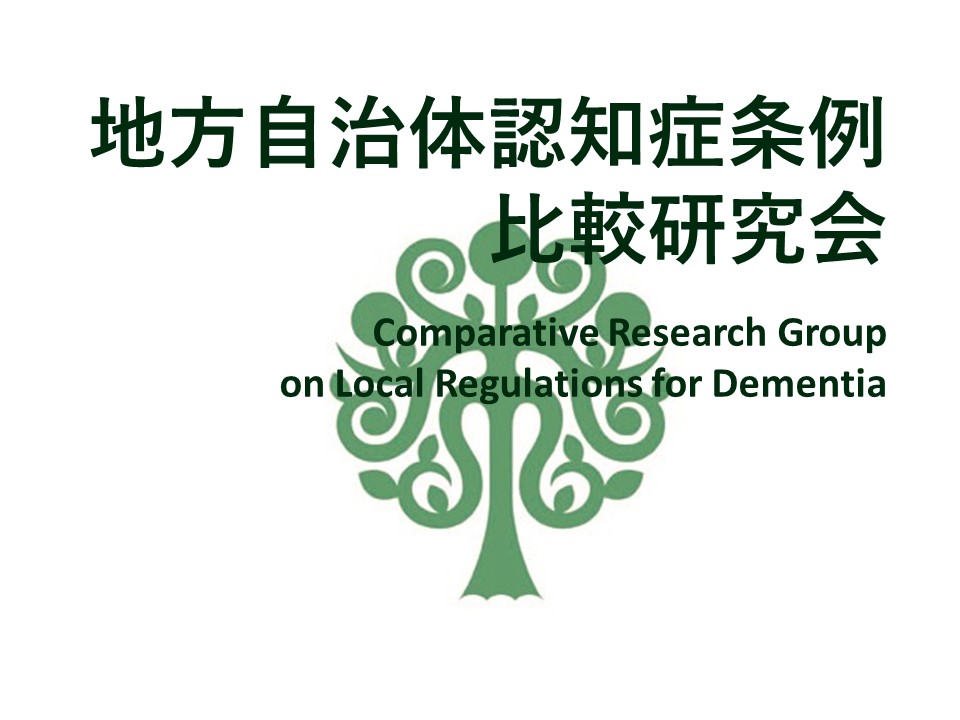
The 12th Meeting of the Comparative Research Group on Local Regulations for Dementia
Participants held a hearing with Tondabayashi City, Osaka Prefecture. Tondabayashi City enacted the “Tondabayashi City Regulation for a Happy City That Walks Together with Dementia” in 2022.
Mental Health
2023.03.29
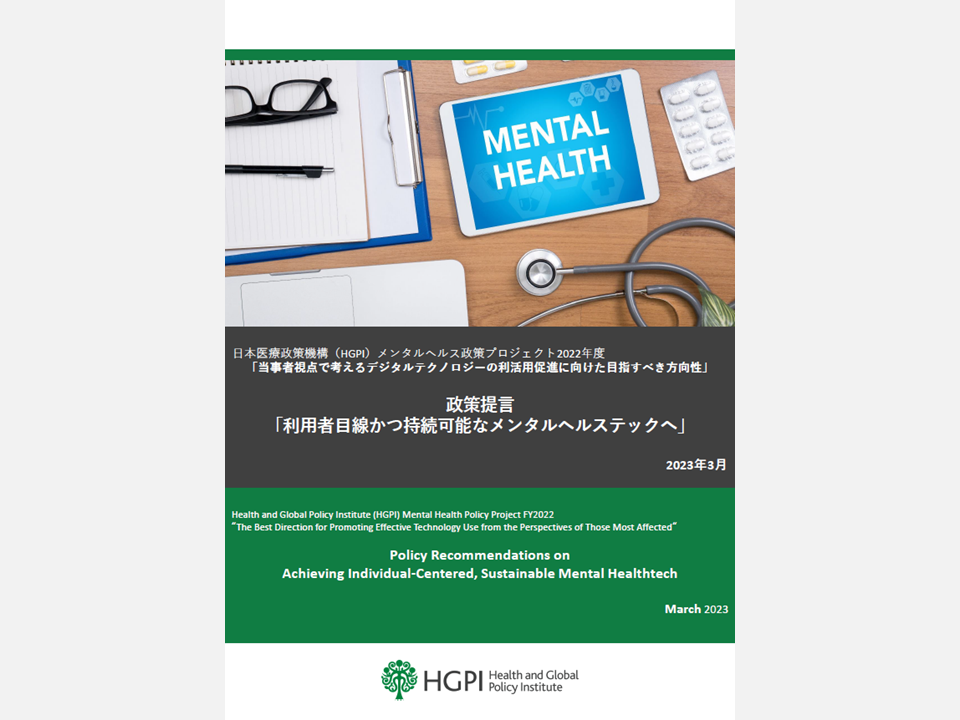
Policy Recommendations
The Best Direction for Promoting Effective Technology Use from the Perspectives of Those Most Affected “Achieving Individual-Centered, Sustainable Mental Healthtech”
The HGPI Mental Health Policy Project has presented recommendations regarding mental healthtech, where the use of digital technology in the areas of prevention and health promotion for mental health is advancing rapidly. The recommendations have been compiled from the four perspectives of “Establishing an environment for the area of mental healthtech,” “Emphasizing evidence and usability,” “Mechanisms for user-driven choice and a universal provision system,” and “Establishing and strengthening links between mental healthtech and psychiatry.”
Child Health
2023.02.17
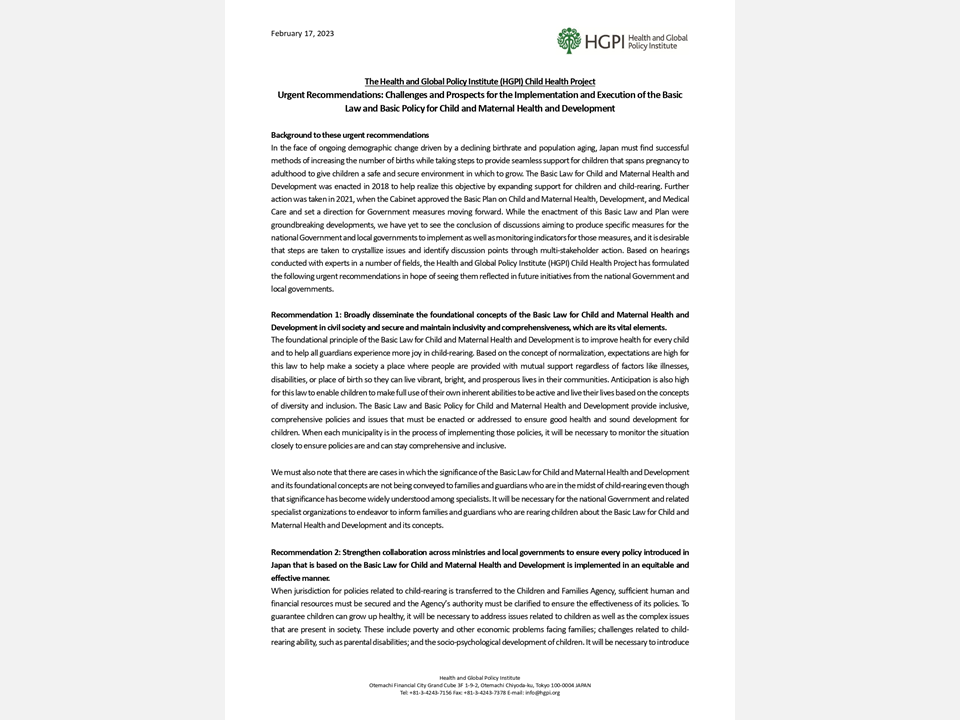
Urgent Recommendations
Challenges and Prospects for the Implementation and Execution of the Basic Law and Basic Policy for Child and Maternal Health and Development
Based on hearings conducted with experts in a number of fields, HGPI Children’s Health Promotion Project has formulated the following urgent recommendations in hope of seeing them reflected in future initiatives from the national Government and local governments.
Recommendation 1: Broadly disseminate the foundational concepts of the Basic Law for Child and Maternal Health and Development in civil society and secure and maintain inclusivity and comprehensiveness, which are its vital elements.
Recommendation 2: Strengthen collaboration across ministries and local governments to ensure every policy introduced in Japan that is based on the Basic Law for Child and Maternal Health and Development is implemented in an equitable and effective manner.
Recommendation 3: Utilize public-private partnerships to evaluate and monitor policies related to children’s health from a biopsychosocial perspective and standardize indicators nationwide to make comparative evaluations possible.
Recommendation 4: Ensure the results of research related to children’s health can be rapidly implemented in society by building a research system, expanding financial support, and promoting government-academia collaboration on an ongoing basis.
Recommendation 5: Utilize tools that leverage digital health and other technologies to optimize the healthcare provision system while promoting cooperation among health services, welfare services, and the administration.
Recommendation 6: Build an integrated system that encompasses the public and private sectors and delivers seamless child-rearing support that reaches all family members.
Recommendation 7: Enhance areas where assistance and measures are insufficient through focused support that spans the perinatal period to school age.
Pain-free delivery, Postpartum care, Breastfeeding, Mass screenings for newborns, Abuse of children under one year of age, Medical examinations and checkups for psychological and social health, Utilizing screening programs for school age-children to provide early detection and treatment for familial diseases, Introduce comprehensive sex education and medical ethics education
2023.02.07
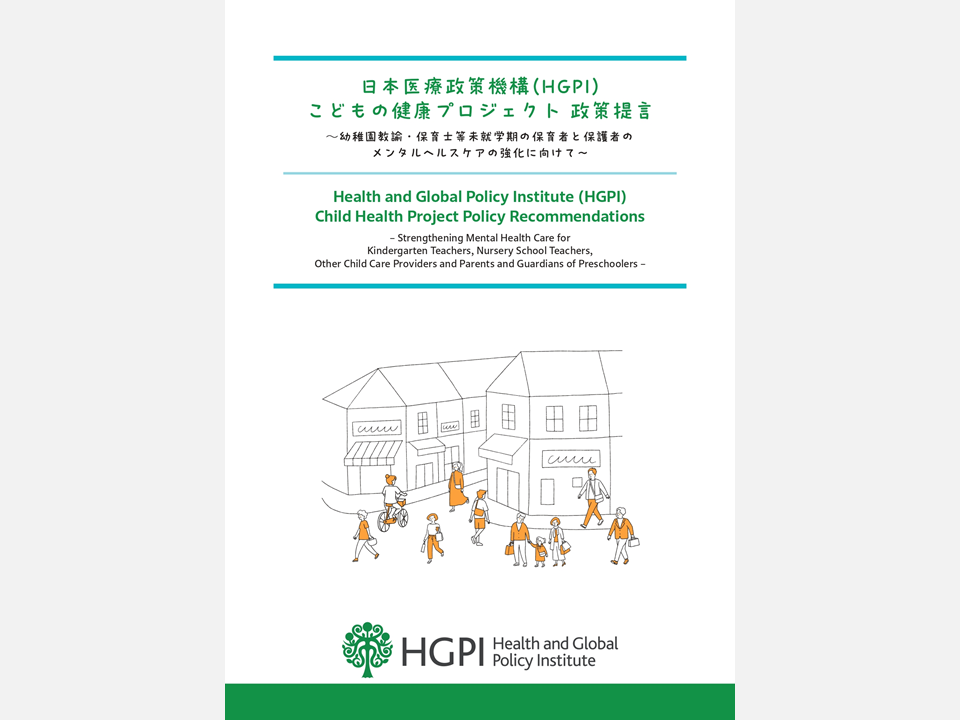
Recommendations
Strengthening Mental Health Care for Kindergarten Teachers, Nursery School Teachers, Other Child Care Providers and Parents and Guardians of Preschoolers
By disseminating those recommendations to policymakers and similar parties, we will aim to contribute to better health for children.
Overview
Perspective 1: Kindergarten and nursery school teachers must be provided education, counseling and support as professionals who support the lives of children
1-1: The need for further evidence-based mental health education in kindergarten and nursery school teacher training programs
1-2: The need for regular, practical mental health education and training in early childhood education and child care setting
1-3: The need to establish a system of support and collaboration at the regional level so that children, parents and guardians can be offered a support system in a sustainable way that does not place an undue burden on facilities
1-4: The importance of developing a system for kindergarten and nursery school teachers to consult with experts for their own mental health care
Perspective 2: Parents and guardians must deepen their understanding and take care of both their child’s mental health and their own
2-1: The need to ensure that parents and guardians have continuous access to information on children’s mental development and health and that they have opportunities for timely and appropriate counseling and support regarding their children
2-2: The need to ensure that parents and guardians have continuous access to information on mental health and stress management for themselves and that they have opportunities for timely and appropriate counseling and support for their own mental health care
2-3: The need to centralize information so that parents and guardians responsible for raising children can easily obtain information regarding their child’s mental health and their own
2023.02.06
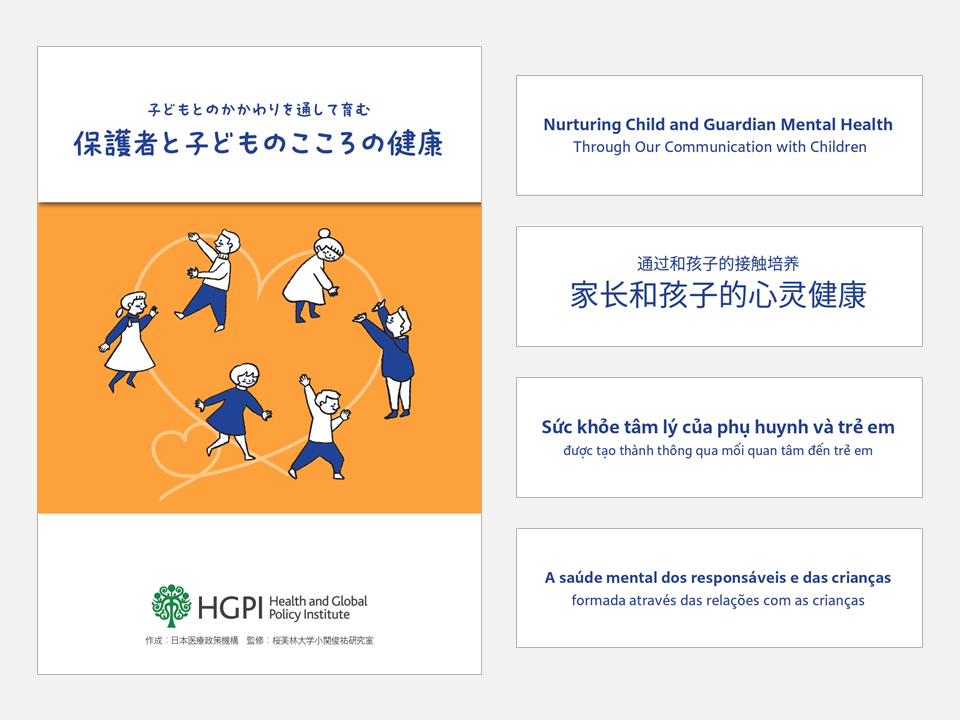
Family Mental Health Booklet in Five Languages
Nurturing Child and Guardian Mental Health through Our Communication with Children
The HGPI Children’s Health Project has released a booklet on mental health for families. Recognizing that an increasing number of families do not speak Japanese at home, in addition to Japanese, this booklet is available in English, Simplified Chinese, Vietnamese, and American Portuguese.
Women’s Health
2023.03.06
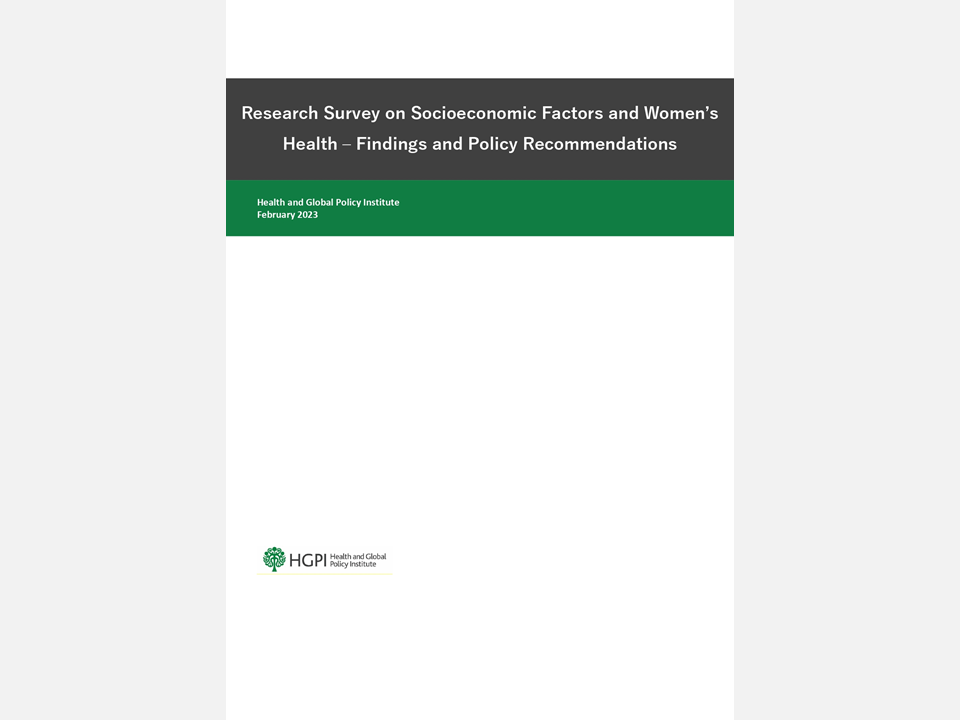
Research Report
Research Survey on Socioeconomic Factors and Women’s Health – Findings and Policy Recommendations
In conjunction with Women’s Health Week (March 1-8), HGPI released a survey report, “Research Survey on Socioeconomic Factors and Women’s Health.”
The survey results suggest that menstrual symptoms and menopausal symptoms have a significant impact on women’s social life and cause economic losses, and that there are large differences in the utilization of menstrual leave depending on company size and employment status, suggesting the need for measures, including broad labor policies.
Four Recommendations
Recommendation 1: Recognize that initiatives for women’s health are not only important from the perspective of improving sexual and reproductive health and rights for women, but they are also vital from the perspective of reducing socioeconomic losses.
Recommendation 2: In view of the fact that many women are still suffering from dysmenorrhea or menopausal symptoms and refrain from seeking medical attention despite major struggles due to those conditions, advance initiatives centered around primary care and family obstetrics and gynecology to help women receive necessary care from physicians.
Recommendation 3: Correct disparities among companies, industries, and occupations, as well as between men and women, regarding general knowledge and systems for women’s health.
Recommendation 4: Create opportunities for comprehensive sex education during school and provide guardians with opportunities to refresh their education on such subjects through parents’ classes and workplace training programs.
2023.01.10

Policy Recommendations on Building Platforms for Reproductive Health and Rights
Making Society a Place Where Educational and Consultation Opportunities Are Available to All
In 2021, the HGPI Women’s Health Project launched its reproductive health and rights platform Youth Terrace with the objective of promoting SRHR in Japan. Below, we provide recommendations regarding the ideal methods of engaging in such platform initiatives. In doing so, we hope to contribute to the further development of SRHR in Japan by sharing the lessons we learned from implementing our platform with wider society.
Executive summary
Perspective 1: The need to expand educational opportunities for comprehensive sex education and to promote understanding of SRHR throughout society to meet the needs of Japan today
- Expand the content covered during sex education in schools to reflect the content of the International Technical Guidance on Sexuality Education.
- In order to provide expanded comprehensive sex education during school education, curriculums on SRHR in teacher training courses and teacher training opportunities should be expanded.
- Work together with educational institutions to create opportunities for training on SRHR for households and community members.
- At healthcare institutions, which have the potential to become key providers of consultations, educational opportunities for health care professionals should be expanded to include SRHR in training courses with the objective of providing health services from the perspective of the parties involved. Training opportunities for healthcare professionals provided after graduation should also be enhanced.
Perspective 2: The need to expand opportunities for people to obtain accurate information regarding SRHR throughout the life course and have access to consultations on their troubles when necessary
- Expand support systems so working adults can obtain accurate information regarding SRHR on a continuous basis to match each stage in life, as well as to have access to consultations when necessary.
- Discussions on SRHR in the field of occupational health should be encouraged to bolster systems for continuous SRHR support for working adults. Specifically, this includes the need to provide companies with incentives to establish SRHR consultation services and to hold training courses and other programs on SRHR.
- To meet the needs of today, public institutions should disseminate information on SRHR through the proactive and effective use of tools like online media and social networks, as well as reinforce efforts to build awareness toward SRHR among uninterested people by collaborating with highly influential content producers.
Perspective 3: The need to provide long-term financial support to implement sex education programs that fully incorporate SRHR, to enable effective awareness-building activities, and to establish continuous consultation services
- To provide sex education that fully covers SRHR, it will be important to achieve nationwide equity in sex education and training opportunities. Surveys should be conducted to grasp the real-world implementation status of sex education and training programs and continuous budgets should be secured to provide the interventions deemed necessary according to the results of those surveys.
- When conducting activities to raise awareness and establish consultation services for SRHR, instead of operating services through public organizations alone, it will be necessary to expand activities within civil society organizations and private sectors to make it possible to provide services that better meet the needs of those most affected. While encouraging joint public-private activities like these, continuous financial support for such activities should also be expanded.
Global Health
2023.03.07
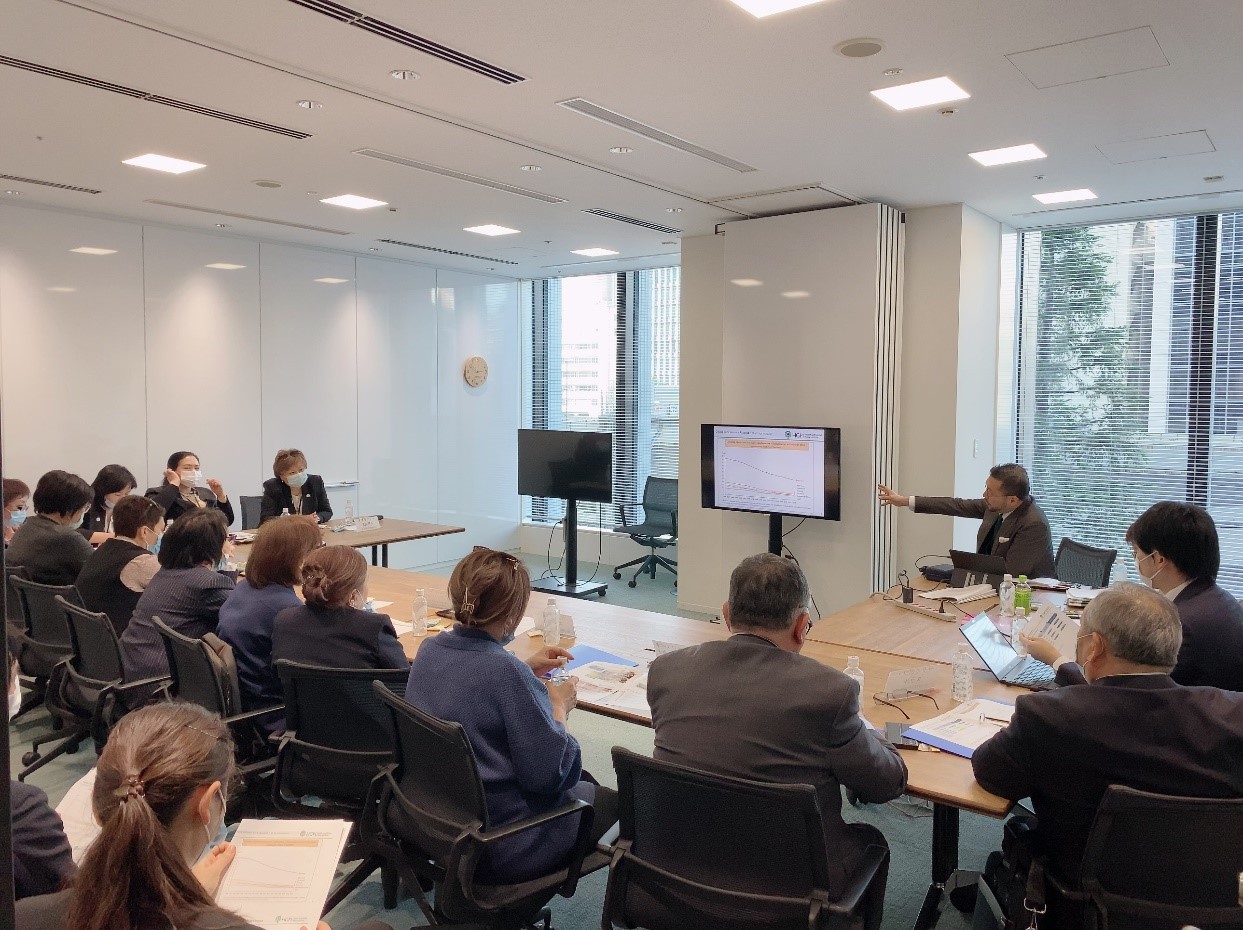
Discussion the Kyrgyz Delegation to Japan
Project for Strengthening Pilot Referral System for Early Detection and Treatment of Non-Communicable Diseases
HGPI Board Member and CEO Mr. Ryoji Noritake gave a presentation entitled “Paradigm Shift in Healthcare in Japan and Beyond,” explained how Japan is responding to the challenges of aging and non-communicable diseases as a policy matter and how various aspects of healthcare and systems in other countries are being compared internationally and exchanged ideas with the participants.
2023.01.27-01.29

The Prince Mahidol Award Conference (PMAC) 2023
Setting a New Health Agenda – at the Nexus of Climate Change, Environment and Biodiversity
HGPI Senior Manager Mr. Joji Sugawara attended the Prince Mahidol Award Conference (PMAC) 2023 in Bangkok, Thailand. The event was hosted by the Government of Thailand and the Prince Mahidol Award Foundation with various co-hosts including the Japan International Cooperation Agency (JICA).
2023.01.10
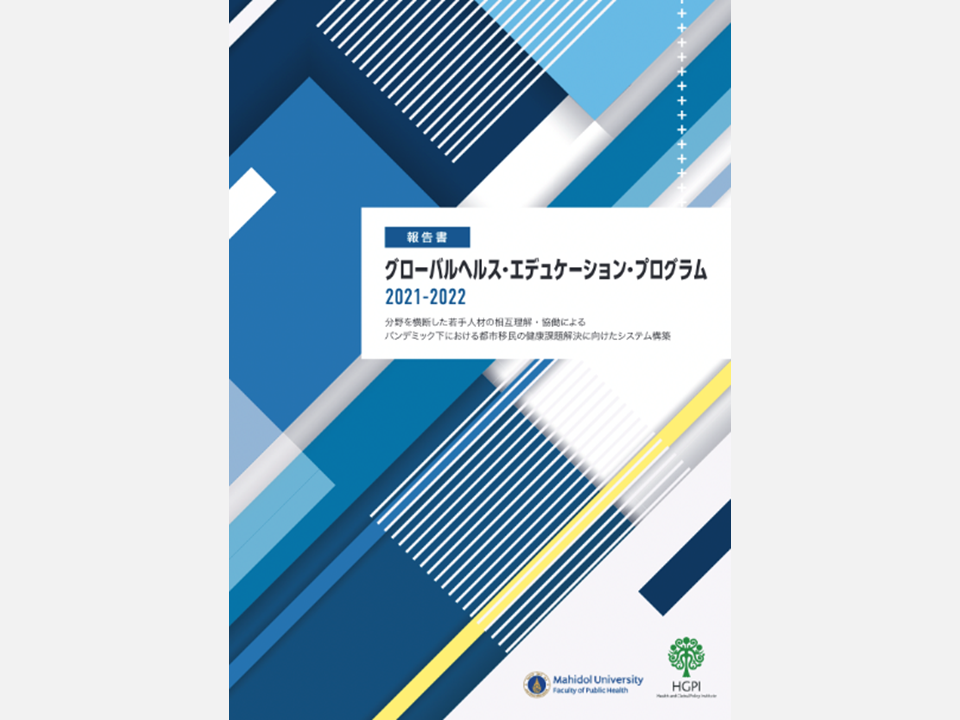
The Global Health Education Program (G-HEP) 2021-2022
Solving Health Issues for COVID-19 and Urban Migration
The Global Health Education Program (G-HEP) 2021-2022 final report has been released. G-HEP, is a jointly organized program by HGPI and Mahidol University, Faculty of Public Health in Thailand. The aim of the program focused on knowledge-sharing, obtaining new perspectives, and deepening mutual understanding among students and young professionals in Asia.
Future of the Healthcare System
2023.03.28
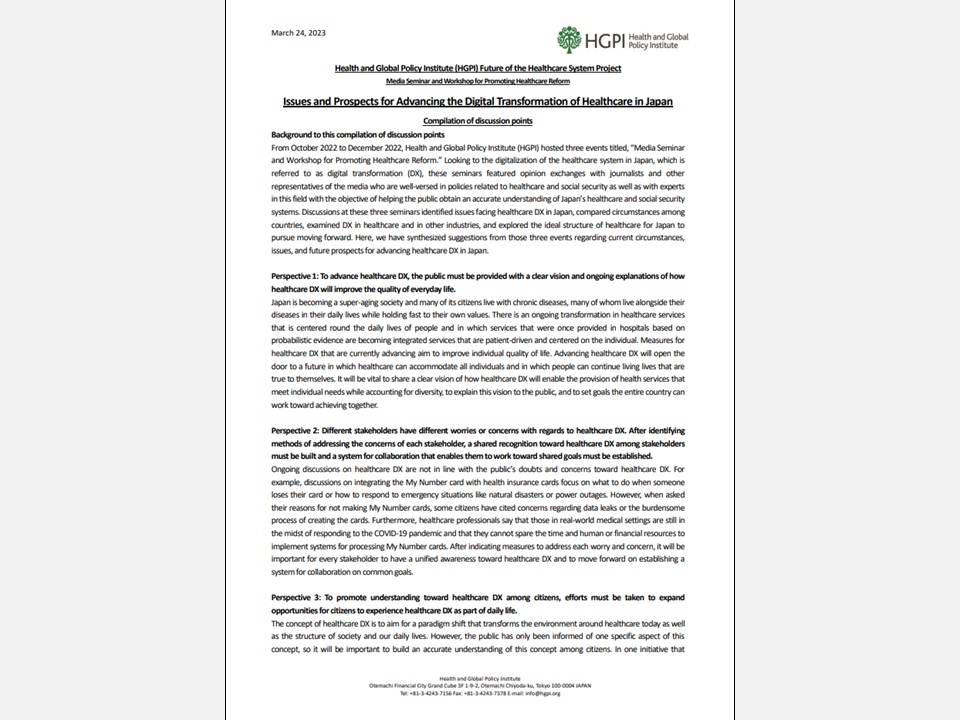 Media Seminar and Workshop for Promoting Healthcare Reform
Media Seminar and Workshop for Promoting Healthcare Reform
Issues and Prospects for Advancing the Digital Transformation of Healthcare in Japan
Looking to the digitalization of the healthcare system in Japan, which is referred to as digital transformation (DX), these seminars featured opinion exchanges with journalists and other representatives of the media who are well-versed in policies related to healthcare and social security as well as with experts in this field with the objective of helping the public obtain an accurate understanding of Japan’s healthcare and social security systems. We have synthesized suggestions from those three events regarding current circumstances, issues, and future prospects for advancing healthcare DX in Japan.
Discussion Points
Perspective 1: To advance healthcare DX, the public must be provided with a clear vision and ongoing explanations of how healthcare DX will improve the quality of everyday life.
Perspective 2: Different stakeholders have different worries or concerns with regards to healthcare DX. After identifying methods of addressing the concerns of each stakeholder, a shared recognition toward healthcare DX among stakeholders must be built and a system for collaboration that enables them to work toward shared goals must be established.
Perspective 3: To promote understanding toward healthcare DX among citizens, efforts must be taken to expand opportunities for citizens to experience healthcare DX as part of daily life.
Perspective 4: Rather than only focusing on carrying out healthcare DX, initiatives should also encompass perspectives on policy criteria and assessment methods for the period after healthcare DX is implemented.
The Third Media Seminar and Workshop
Reexamining Issues and Sharing Opinions on Health Policy in Japan
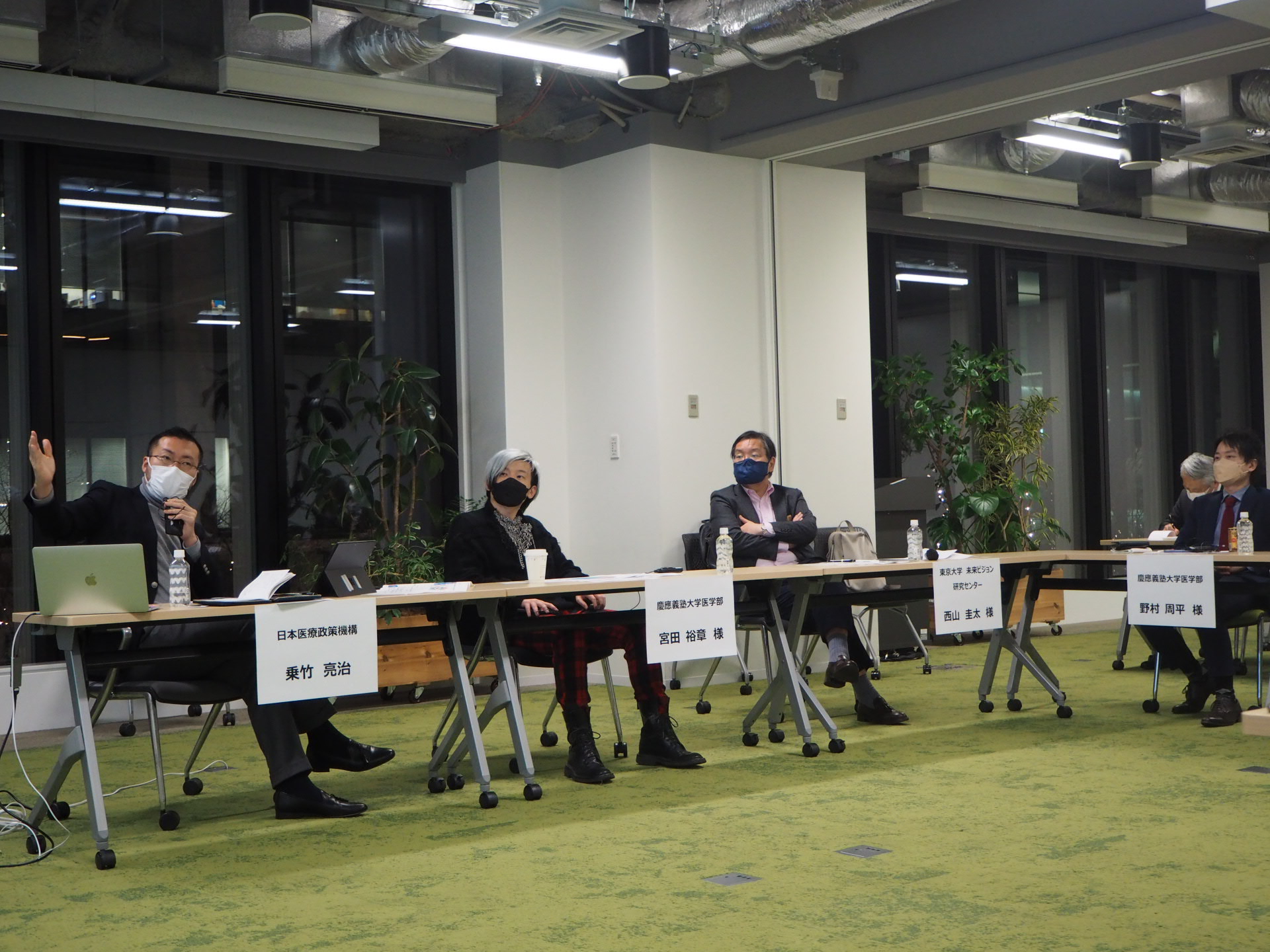
Presentation
Better Co-Being: A Vision for the Future of Health Systems
Hiroaki Miyata (Professor, Department of Health Policy and Management, School of Medicine, Keio University)
The Second Media Seminar and Workshop
Reexamining Issues and Sharing Opinions on Health Policy in Japan
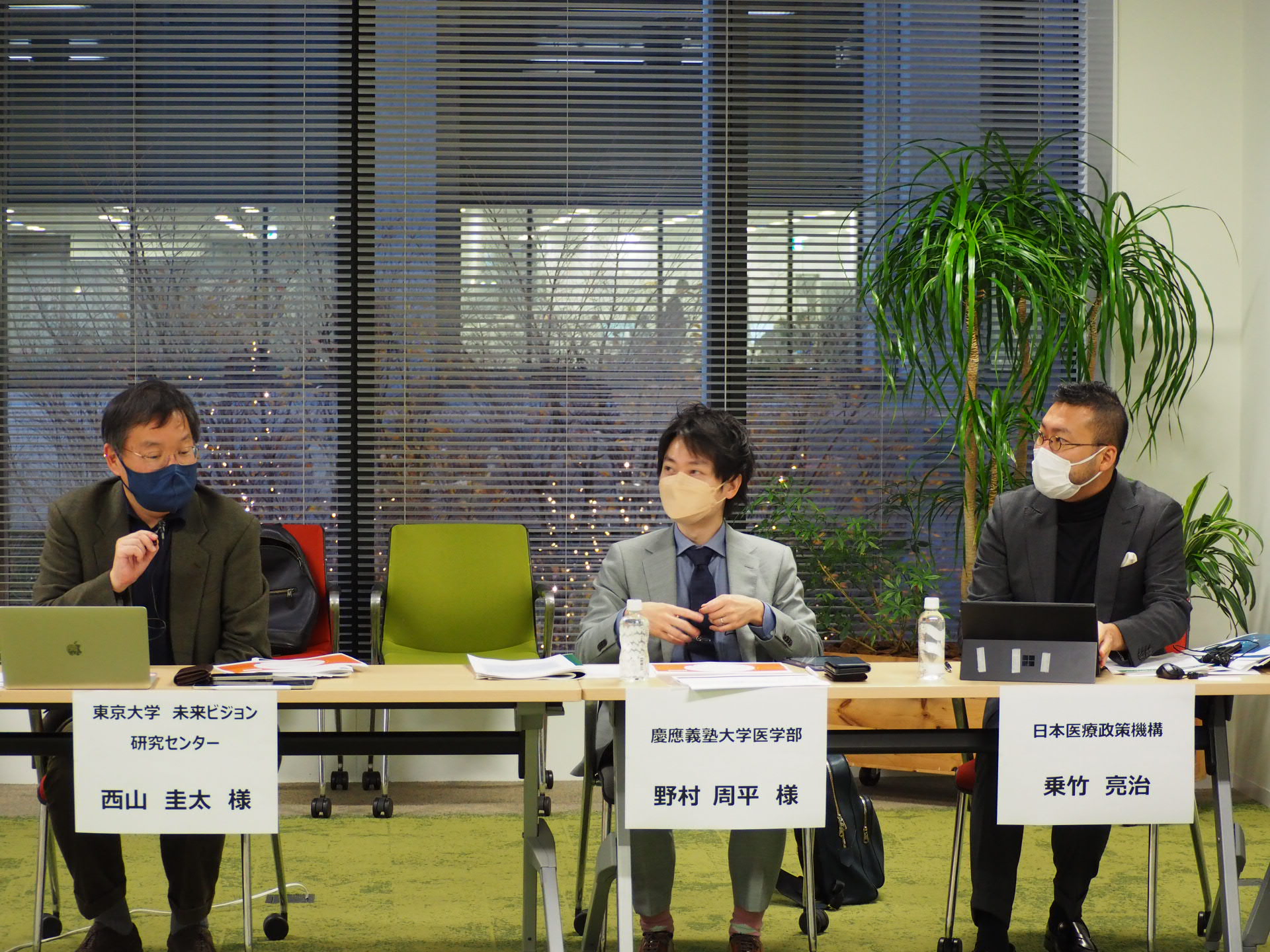
Presentations
The Viewpoints Needed to Envision Health System Reform and the Involvement of DX
Keita Nishiyama (Visiting Professor, Institute for Future Initiative, University of Tokyo)
The Future of Japan’s Healthcare System: Transitioning to More Tailor-Made Health Services for More Engagement and Better Health
Shuhei Nomura (Project Associate Professor, Department of Health Policy and Management, School of Medicine, Keio University)
The First Media Seminar and Workshop
Understanding Circumstances and Issues in the Domestic Health Sector Today
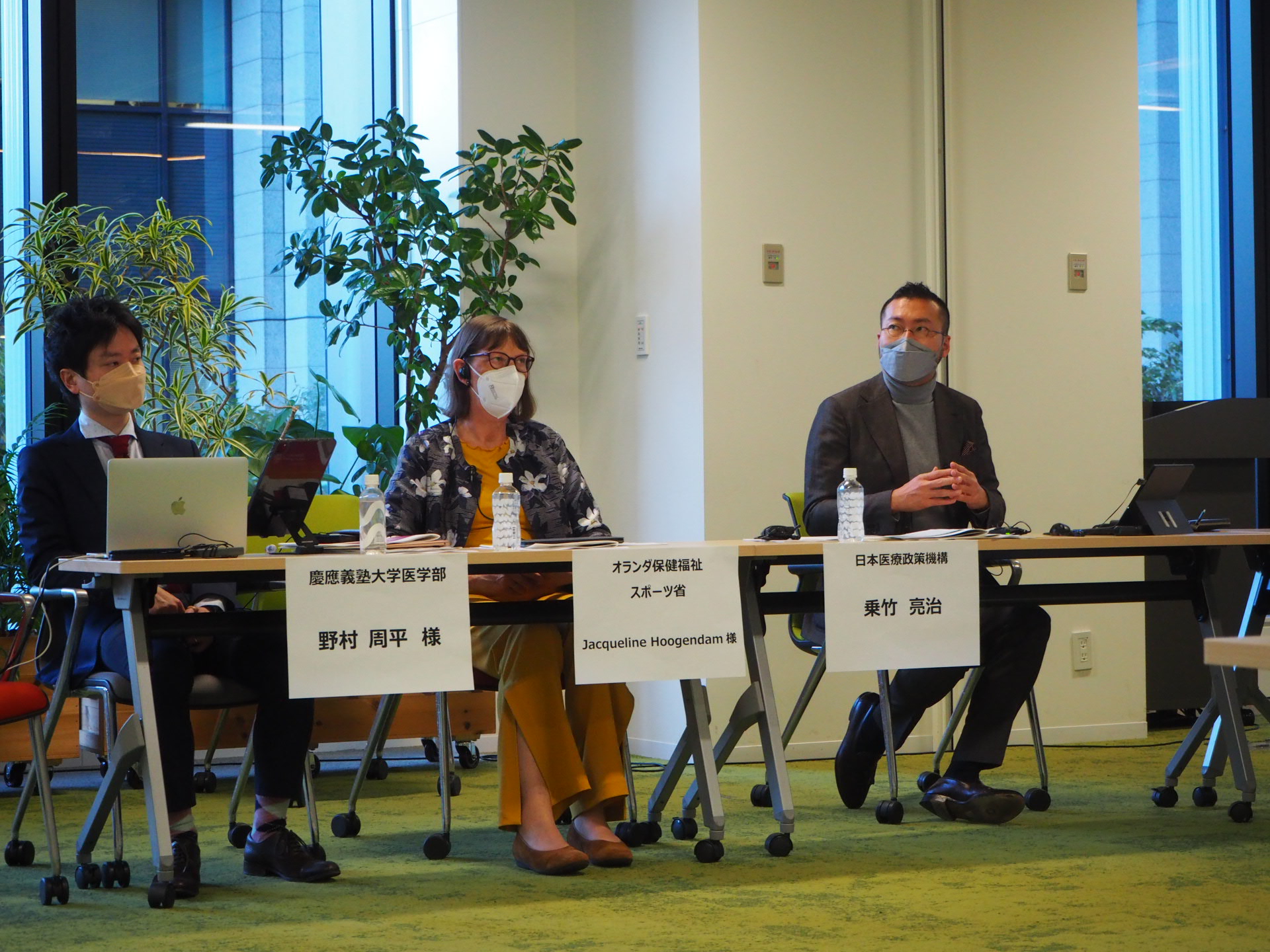
Presentations
Health in Japan Today and the Potential of Healthcare DX
Shuhei Nomura (Project Associate Professor, Department of Health Policy and Management, School of Medicine, Keio University)
Digital care in long-term care in the Netherlands
Jacqueline Hoogendam (Ministry of Health, Welfare and Sport, The Netherlands)
Non-partisan Diet Member study session
2023.03.09
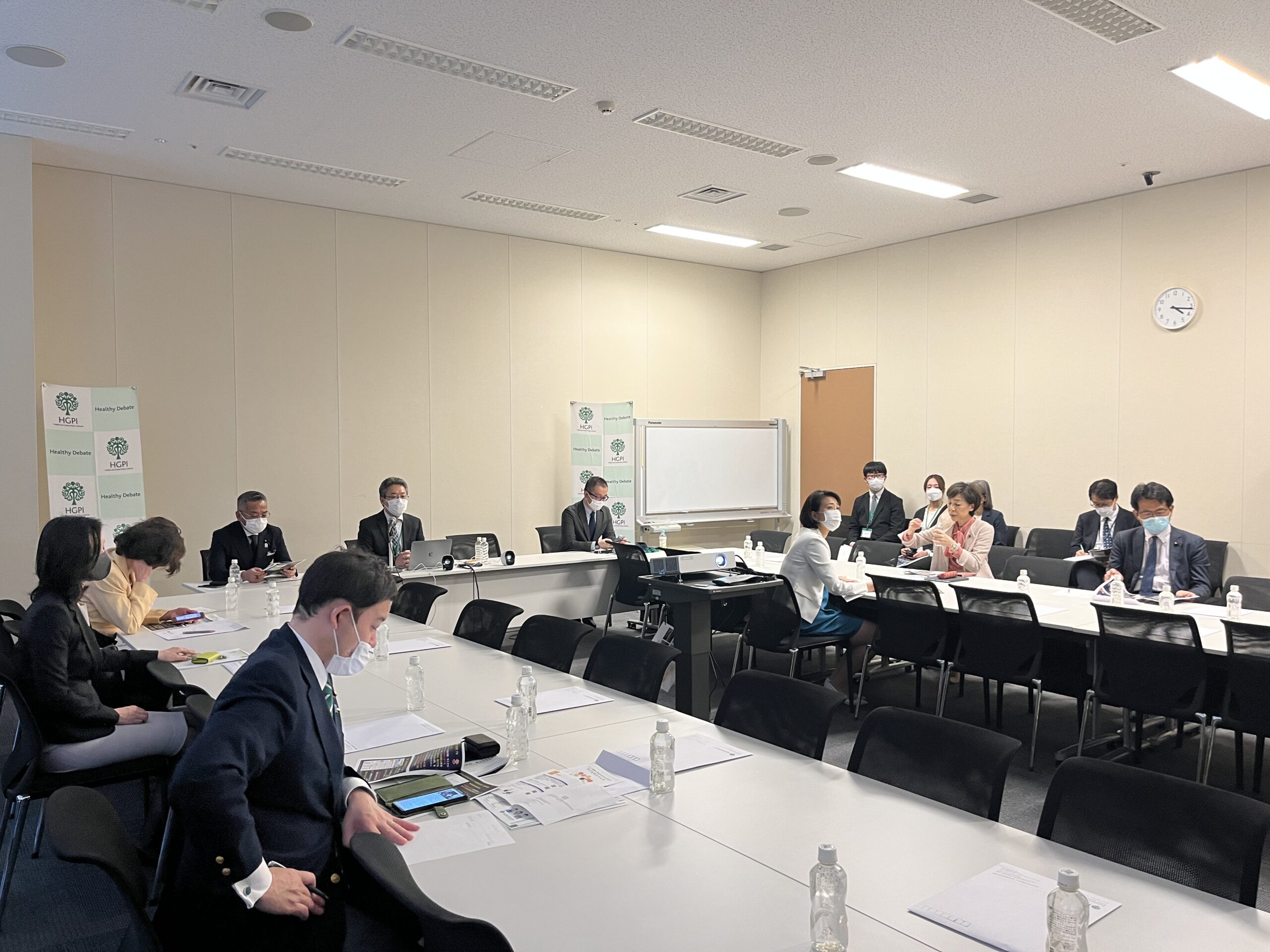
Non-partisan Diet Member Briefing – 30-minute Health Policy Update
Considering Children’s Mental Health – Issues in Classrooms and Stress Management
This installment featured a lecture from Professor Hironori Shimada, who serves as a member of the Faculty of Human Sciences at Waseda University and as Chairman of the Japan Society of Stress Management. Speaking on the topic of stress management for children, Professor Shimada discussed underlying factors for stress among children, examined trends in recent years, and provided an overview of stress reactions and methods of noticing and responding to stress. He also introduced recent policy trends, issues facing schools and families, and a vision for the future direction to take to address those issues.
Key points of the lecture
- The importance of providing children with stress management education is widely recognized and efforts are currently underway to establish scientific evidence, legislation, and guidelines for schools on stress management education.
- The curriculum that must be covered in classrooms includes a vast amount of information across many subjects, so there is little room to expand it with new content on stress management.
- Educators are currently managing this need by setting aside time during health and physical education or through integrative learning and special activities, but there is room for it to be included in a wide range of other subjects. It will be necessary to examine methods of incorporating stress management education into the curriculum with a holistic view.
- Efforts to distribute tablets and other tools to all children and students are advancing as part of the GIGA School Program. It is feasible to consider expanding the use of these tools beyond traditional lectures and other educational content provided by teachers to include other uses of ICT. For example, it may be possible to use them to conduct stress level tests like the ones currently being administered to adults. Such measures should be given ample consideration moving forward.
2023.02.28
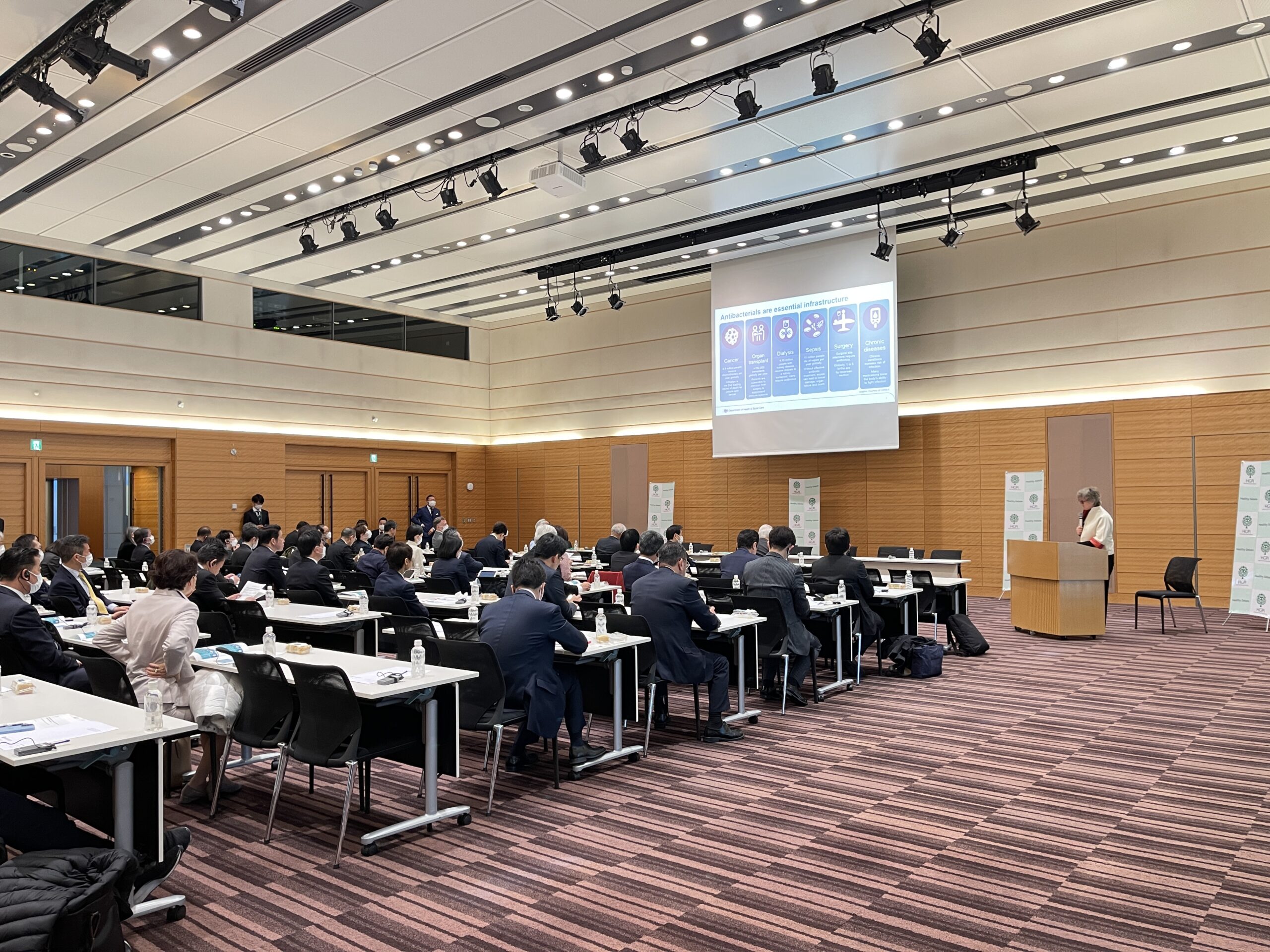
Special Diet Member Study Session
Examining Prospects for International Collaboration on Antimicrobial Resistance (AMR) Ahead of the G7 Hiroshima Summit
HGPI and the Global Leaders Group on Antimicrobial Resistance, which was established by the World Health Organization (WHO) and its partners, co-hosted a study session for members of the Diet entitled “Examining Prospects for International Collaboration on Antimicrobial Resistance (AMR) Ahead of the G7 Hiroshima Summit.” The study session featured a lecture from Dame Sally Davies, who has led global discussions on AMR for many years and previously served as Chief Medical Officer for England. The lecture covered a number of topics including the impact of AMR on the global economy, the importance of antimicrobial innovation, and One Health.
Key points of the lecture
- Antimicrobials are not only vital tools for treating infectious diseases including HIV and malaria, they are also essential for treating cancer and for safely performing various surgical procedures. However, existing antimicrobials have been growing less effective due to the emergence of new AMR bacteria and the propagation of AMR infections. It has been predicted that AMR will result in fewer treatment options within five years, even in the field of cancer. If antimicrobials become ineffective, it may lead to losses of life from dental procedures and cesarean sections.
- AMR control is also important within the frameworks of national and economic security. The manufacturing bases for the active pharmaceutical ingredients (APIs) of 40 key antimicrobials are concentrated in India and China. It has also been projected that failure to take measures to combat AMR now might cost the global economy up to $100 trillion by 2050 and cause a major reduction in GDP.
- The antimicrobial market is collapsing. We must reestablish an environment that enables new antimicrobials to be launched continuously. New classes of antimicrobials have not reached real-world clinical settings and patients since the late 1980s. In addition, the number of newly approved antimicrobials in Japan has declined by half over the past three decades. Japan has not established a mechanism for bringing antimicrobials to market.
- Countries like Japan and the U.K. have started introducing pull incentives to restructure the antimicrobial market and support innovation. Japan’s proposed FY2023 budget allocates 1.1 billion yen for pull incentives and discussions on an Antimicrobial Drug Securement Project are now advancing. To rebuild a climate in which new antimicrobials can be launched in a continuous manner, the antimicrobial market must be improved by restructuring it in a manner that makes the antimicrobial business more predictable and that allows antimicrobials manufacturers to be able to count on generating certain amounts of revenue.
- Antimicrobials are public goods, which means we must improve the structure of the antimicrobial market through measures based on global collaboration, including the introduction of pull incentives, as well as by implementing measures for AMR control based on the One Health approach. As the President of the G7 Hiroshima Summit in 2023, expectations are high for leadership from Japan when advancing measures to combat AMR.
Other Activities
2023.02.18
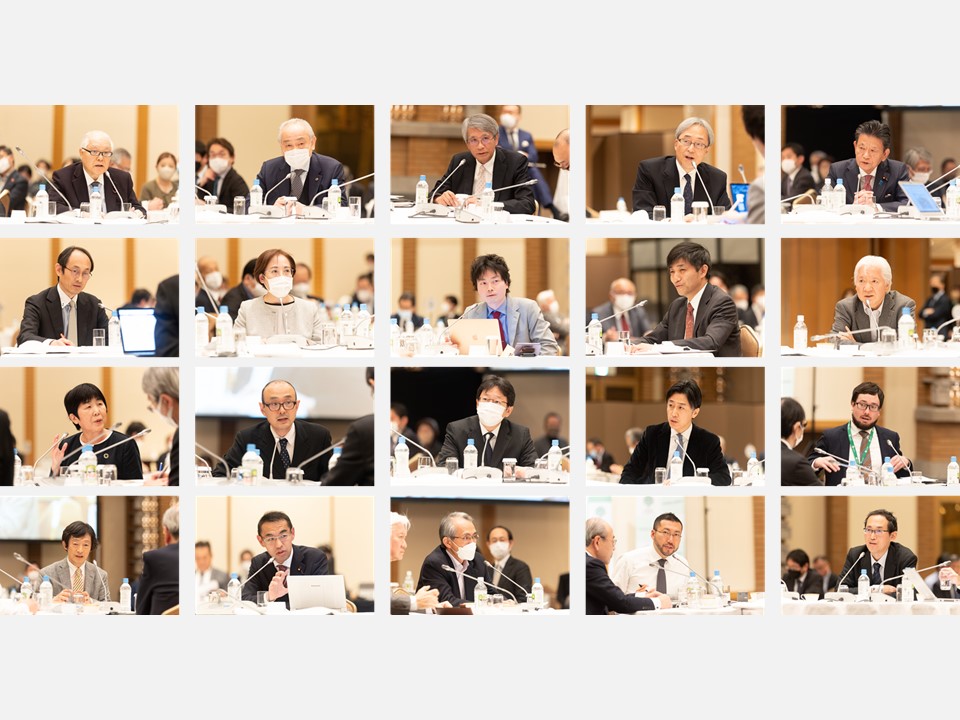
Health Policy Summit 2023
Reconsidering Health Systems on a Planetary Scale
As issues that were characteristic of the Anthropocene era came into clear view, the Health Policy Summit 2023 was titled, “Reconsidering Health Systems on a Planetary Scale” and deepened discussion under two themes: Session 1, or “Reconsidering Infectious Disease Control on a Planetary Scale;” and Session 2, or “Reconsidering Health Systems as Multi-Stakeholders.” Each session consisted of pitch talks from industry, Government, academia, and civil society followed by roundtable discussions with participants.
2023.02.07
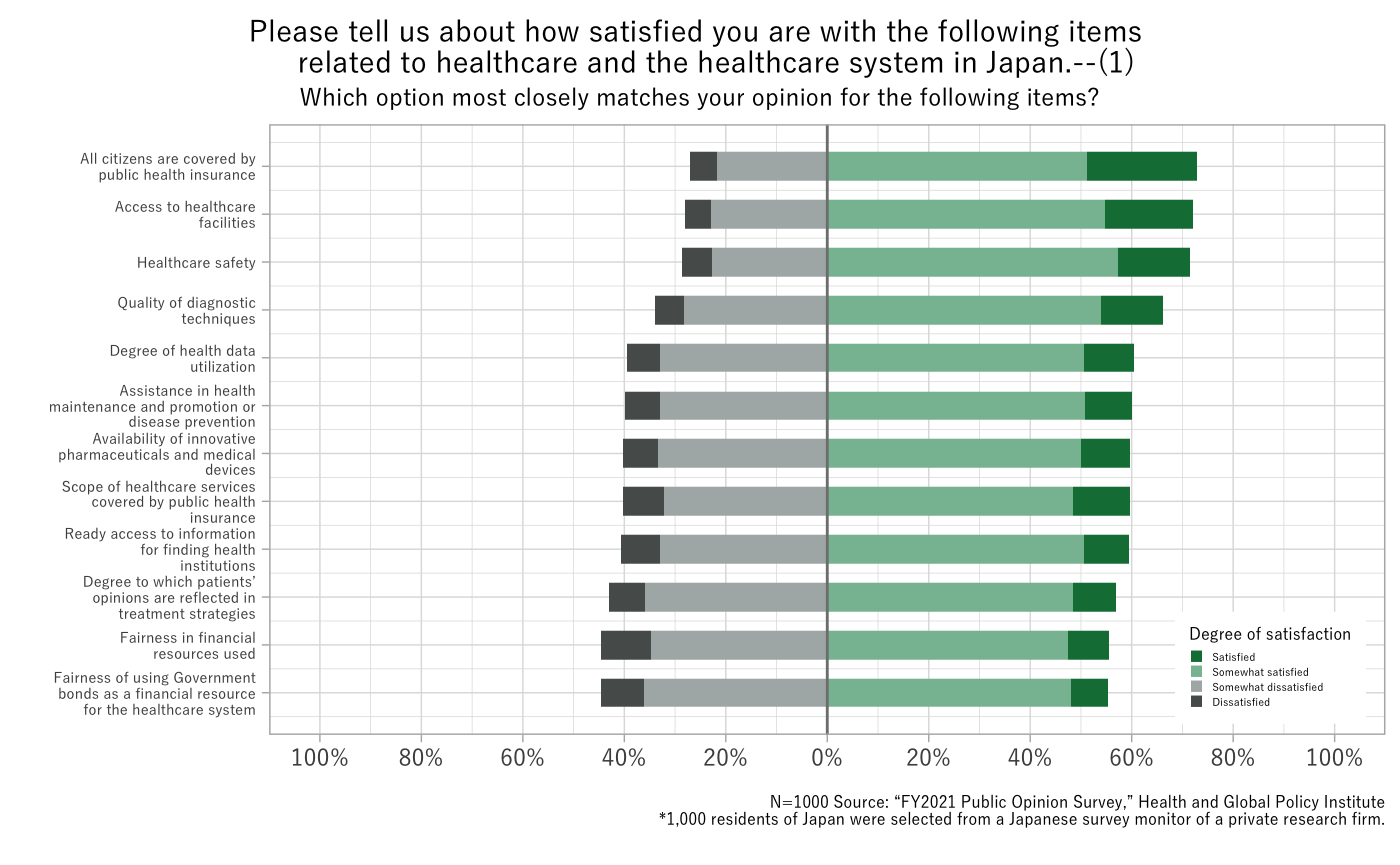
The Public Opinion Survey on Satisfaction in Healthcare and Public Involvement in Health Policy
The item with which respondents were least satisfied was “Ease of understanding of the healthcare system,” followed by “Cost of insurance premiums.” On the other hand, the item that respondents expressed the highest level of satisfaction toward was “All citizens are covered by public health insurance,” which is a key characteristic of Japan’s health insurance system; followed by items related to freedom of access (“Access to healthcare facillities.”).
2022.12
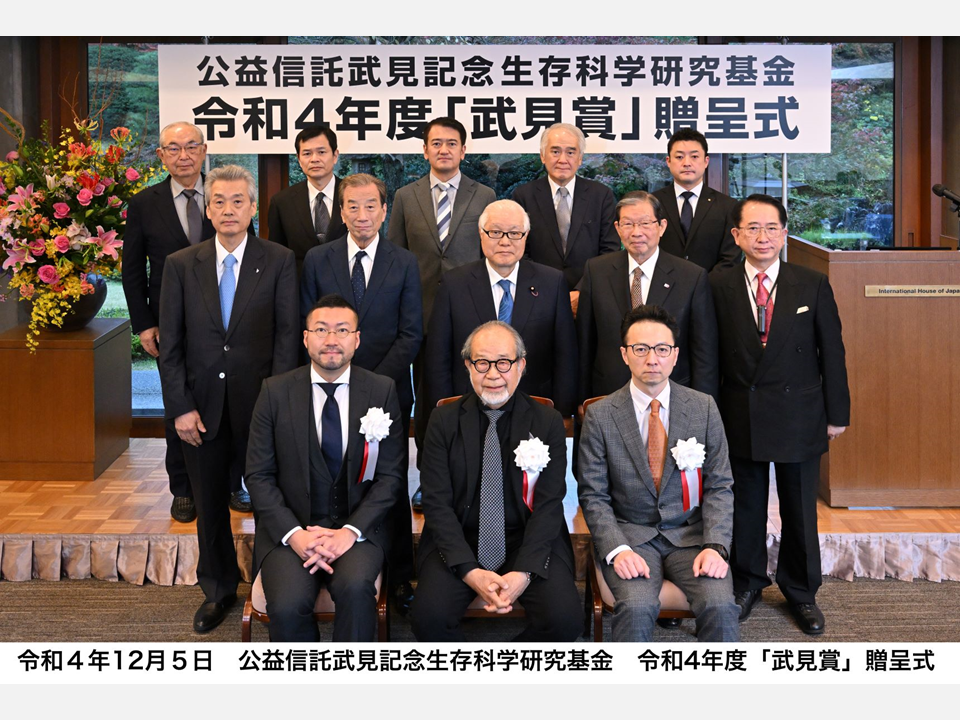
Award Report
FY2022 Takemi Memorial Award for Research in Seizon and Life Sciences
HGPI Board Member and CEO Mr. Ryoji Noritake has been awarded the FY2022 Takemi Memorial Award for Research in Seizon and Life Sciences. Mr. Noritake was recognized for his contributions to the development of a mature civil society by creating opportunities for diverse stakeholders in society and the parties most affected in various areas to come together for exchanges of opinion that surpass the positions of individuals.
HGPI Seminar
2023.03.09
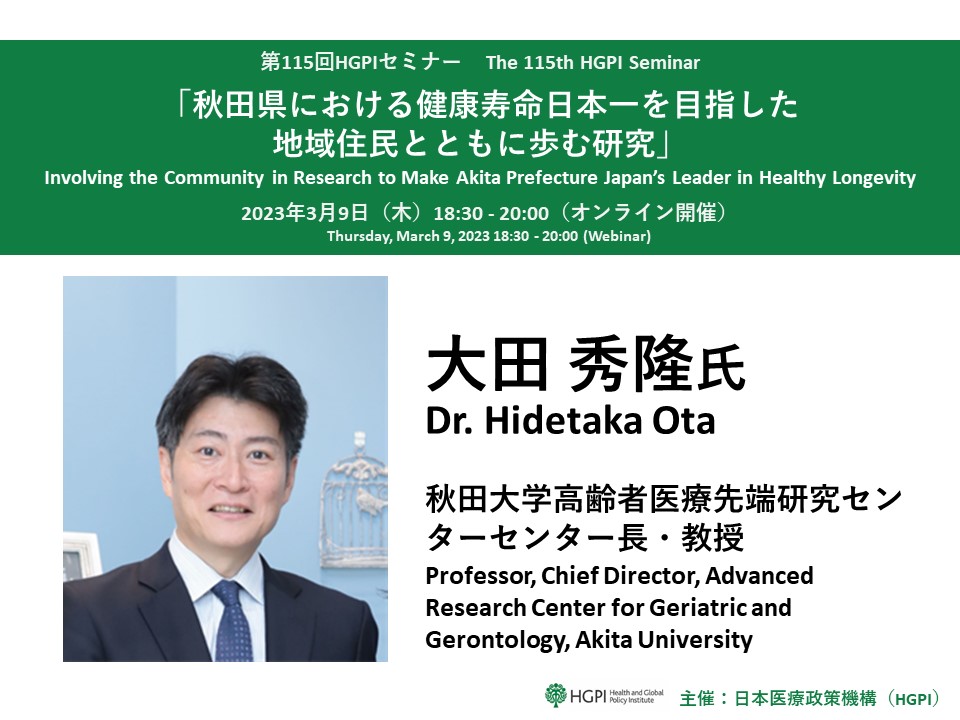
The 115th HGPI Seminar
Involving the Community in Research to Make Akita Prefecture Japan’s Leader in Healthy Longevity
The 115th HGPI Seminar featured an introduction of collaborative efforts for community development led by the Advanced Research Center for Geriatric and Gerontology at Akita University in Akita Prefecture that involve community members as well as the local government, professional associations, and businesses.
2023.03.06
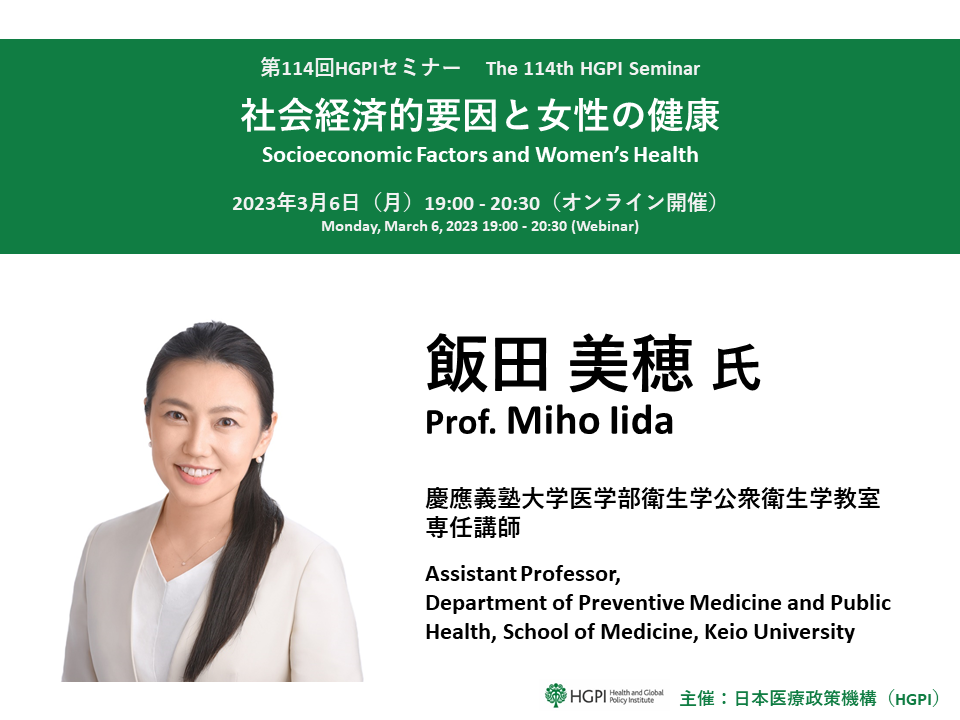
The 114th HGPI Seminar
Socioeconomic Factors and Women’s Health: Measures Needed to Achieve Women’s Health and Advancement
For the 114th HGPI Seminar, we hosted Dr. Miho Iida from the Department of Preventive Medicine and Public Health at the Keio University School of Medicine. Dr. Iida gave a comprehensive overview of socioeconomic factors and women’s health that included an introduction to the “Survey on Socioeconomic Factors and Women’s Health,” which was conducted by HGPI, as well as necessary measures to promote women’s health and enable them to play active roles in society.
2023.03.02
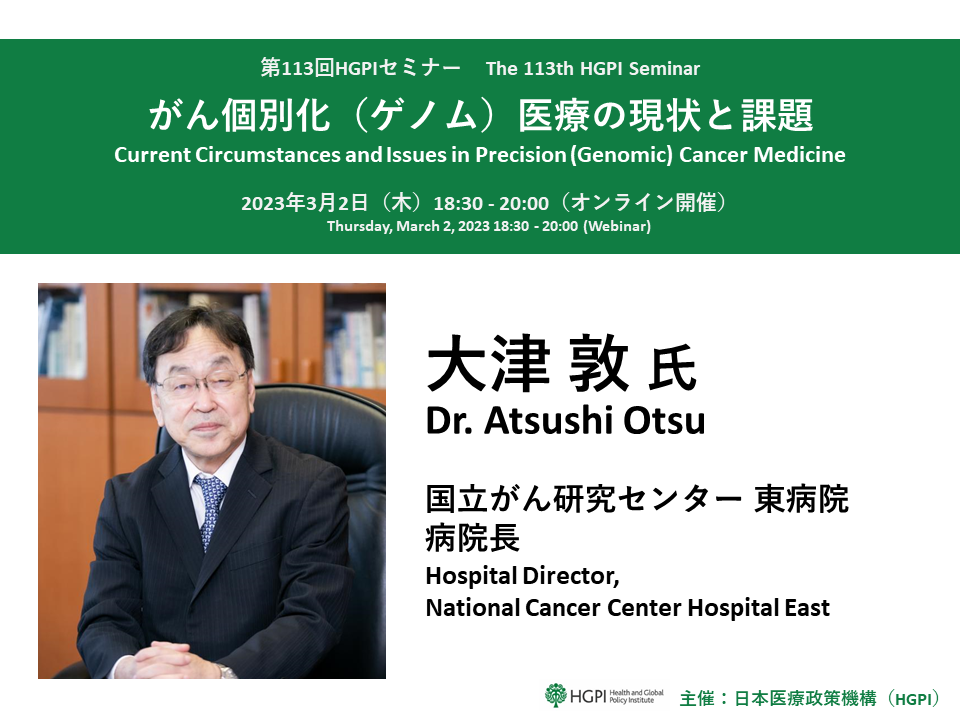
The 113th HGPI Semina
Current Circumstances and Issues in Precision (Genomic) Cancer Medicine
For the 113th HGPI Seminar, we hosted Dr. Atsushi Otsu, Hospital Director of National Cancer Center Hospital East. Dr. Otsu gave a comprehensive lecture on a number of subjects including current circumstances, issues, and latest developments in R&D in the field of precision cancer medicine.
2023.02.08
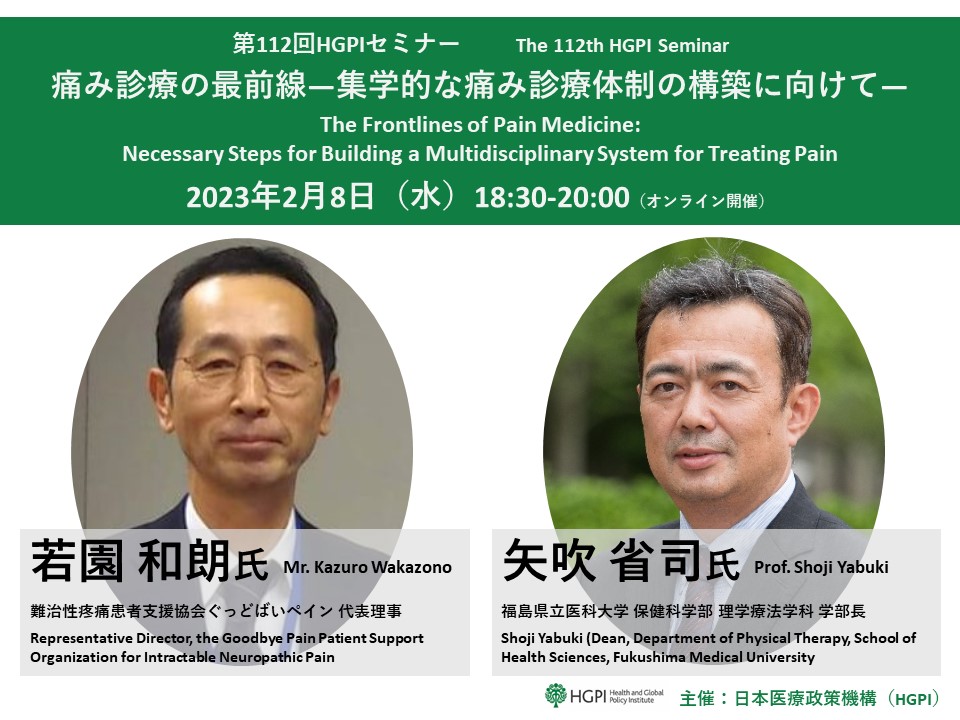
The 112th HGPI Seminar
The Frontlines of Pain Medicine: Necessary Steps for Building a Multidisciplinary System for Treating Pain
For the 112th HGPI Seminar, we hosted Mr. Kazuho Wakazono, who is Representative Director of the Goodbye Pain Patient Support Organization for Intractable Neuropathic Pain; and Professor Shoji Yabuki of Fukushima Medical University’s Department of Pain Medicine. They discussed the latest evidence in the treatment of chronic pain, domestic and international efforts to construct multidisciplinary treatment systems, and current issues and other topics related to Japan’s treatment system.
2023.01.19
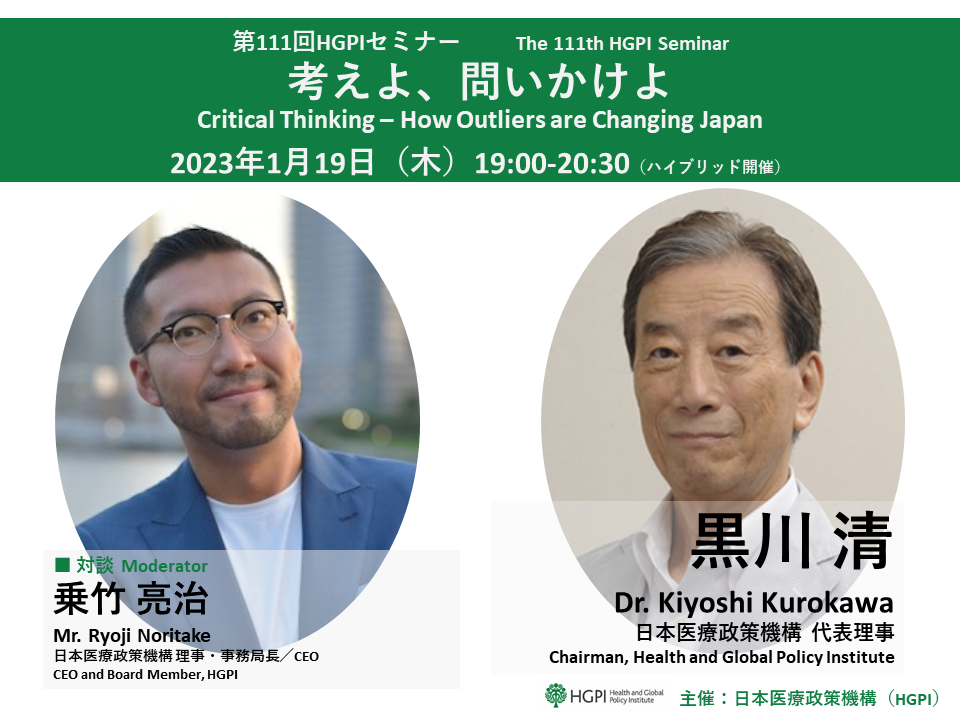
The 111th HGPI Seminar
Critical Thinking – How Outliers are Changing Japan
The 111th HGPI Seminar was this series’ first installment in 2023 and was held using a conversational format that featured HGPI Chairman Dr. Kiyoshi Kurokawa and HGPI CEO and Board Member Mr. Ryoji Noritake. While touching upon the content of Critical Thinking, which stresses the importance of being inquisitive, thinking for oneself, and not taking every situation at face value, Dr. Kurokawa and Mr. Noritake spoke about HGPI’s history and its future prospects
Lectures and Media
HGPI’s projects have been covered by various media outlets both inside and outside of Japan.
2023.03.05
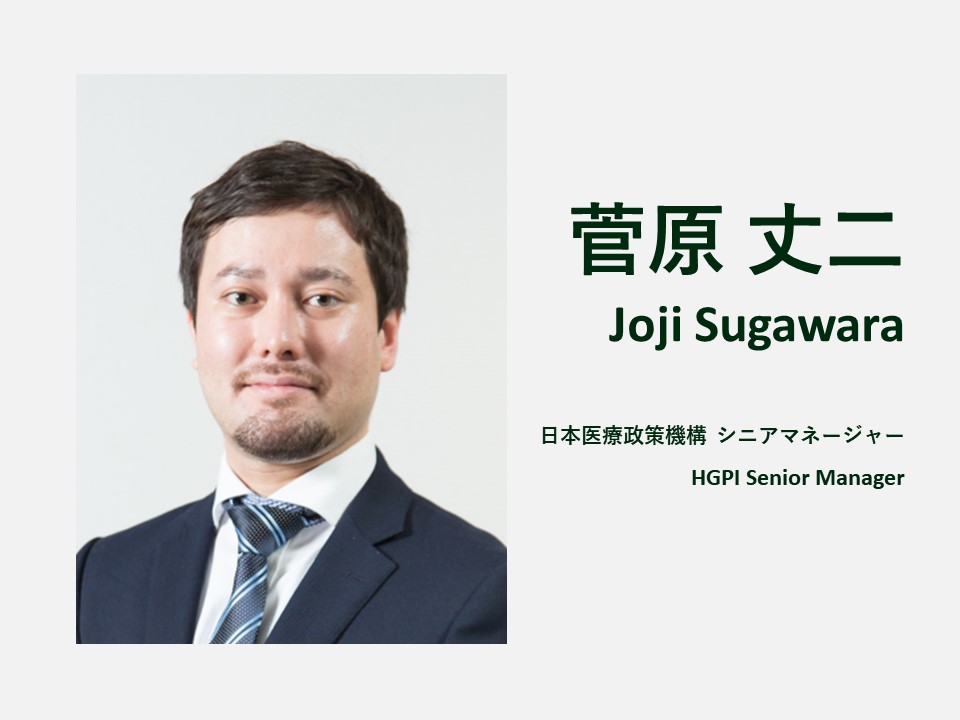 RESULTS Japan: GGG + Toward Building a Sustainable Society that Leaves No One Behind – Can We Work in Solidarity Across Borders? –
RESULTS Japan: GGG + Toward Building a Sustainable Society that Leaves No One Behind – Can We Work in Solidarity Across Borders? –
Part 6: Dealing with the Future with Students
Mr. Joji Sugawara, HGPI Senior Manager, participated in a session GGG + Toward Building a Sustainable Society that Leaves No One Behind – Can We Work in Solidarity Across Borders? – “Part 6: Dealing with the Future with Students”.
2023.02.24
Master of Public Health Program, Faculty of Public Health, Mahidol University
Partnership in Global Health: Perspective from a Think-tank
Health and Global Policy Institute (HGPI) Senior Manager Mr. Joji Sugawara provided a lecture on the “Partnership in Global Health: Perspective from a Think-tank”.
2023.01.11
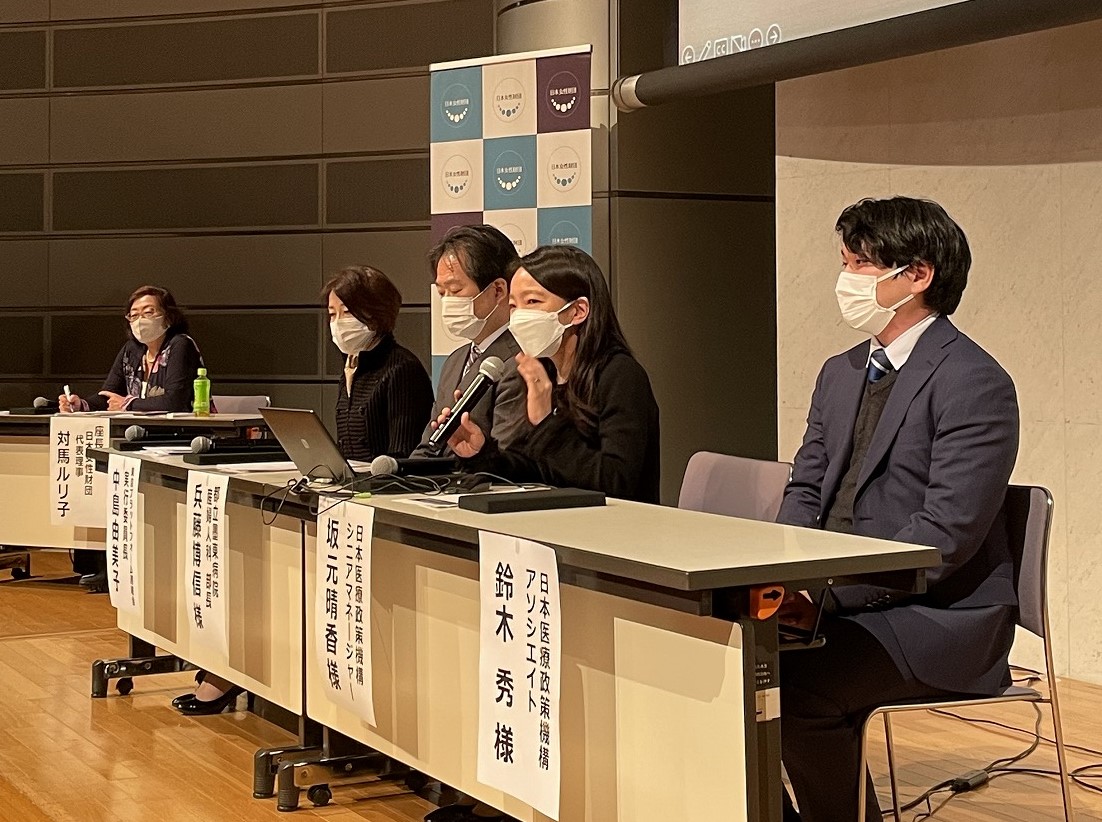
“Tokyo Platform Liaison Committee” symposium hosted by the Japan Women Foundation
Global Youth Health Programs and SRHR Activities
HGPI Senior Manager Prof. Haruka Sakamoto and Associate Mr. Shu Suzuki participated as panelists in the “Tokyo Platform Liaison Committee” symposium hosted by the Japan Women Foundation.
During their discussions, they introduced findings from survey research conducted by HGPI and offered recommendations regarding the expansion of comprehensive sex education and other topics in youth health policy.
|
Health and Welfare, No. 6796 |
|
Min-Iren Iryo, No. 606 |
|
Upholding the Rights of Elderly People was published in February 2023 by Dai-ichi Hoki Co., Ltd |
Advocacy Activities to Encourage the Adoption of the Recommendations in Our Policy Proposals

HGPI composes and publishes reports and policy proposals for each of its projects. HGPI also makes efforts to encourage the implementation of the recommendations contained in those publications through advocacy activities targeting the government and Diet. Those efforts include providing explanations on the content of each report and proposal to representatives from relevant departments with the local and national government or to Diet members and local assembly members on an individual basis. In addition to cooperating closely with parties relevant to each project from the local and national government, HGPI also functions as a hub that creates links within the community of experts in each field when creating content for Diet member study sessions or when drafting bills. We engage in these cooperative efforts with a shared intent of encouraging the implementation of concrete policies based on our recommendations. In the past, recommendations included in HGPI’s reports and policy proposals have been reflected in policies after having been cited in presentations made by various groups within the government, including nonpartisan Diet member groups and project teams, or in proposals composed by those groups.
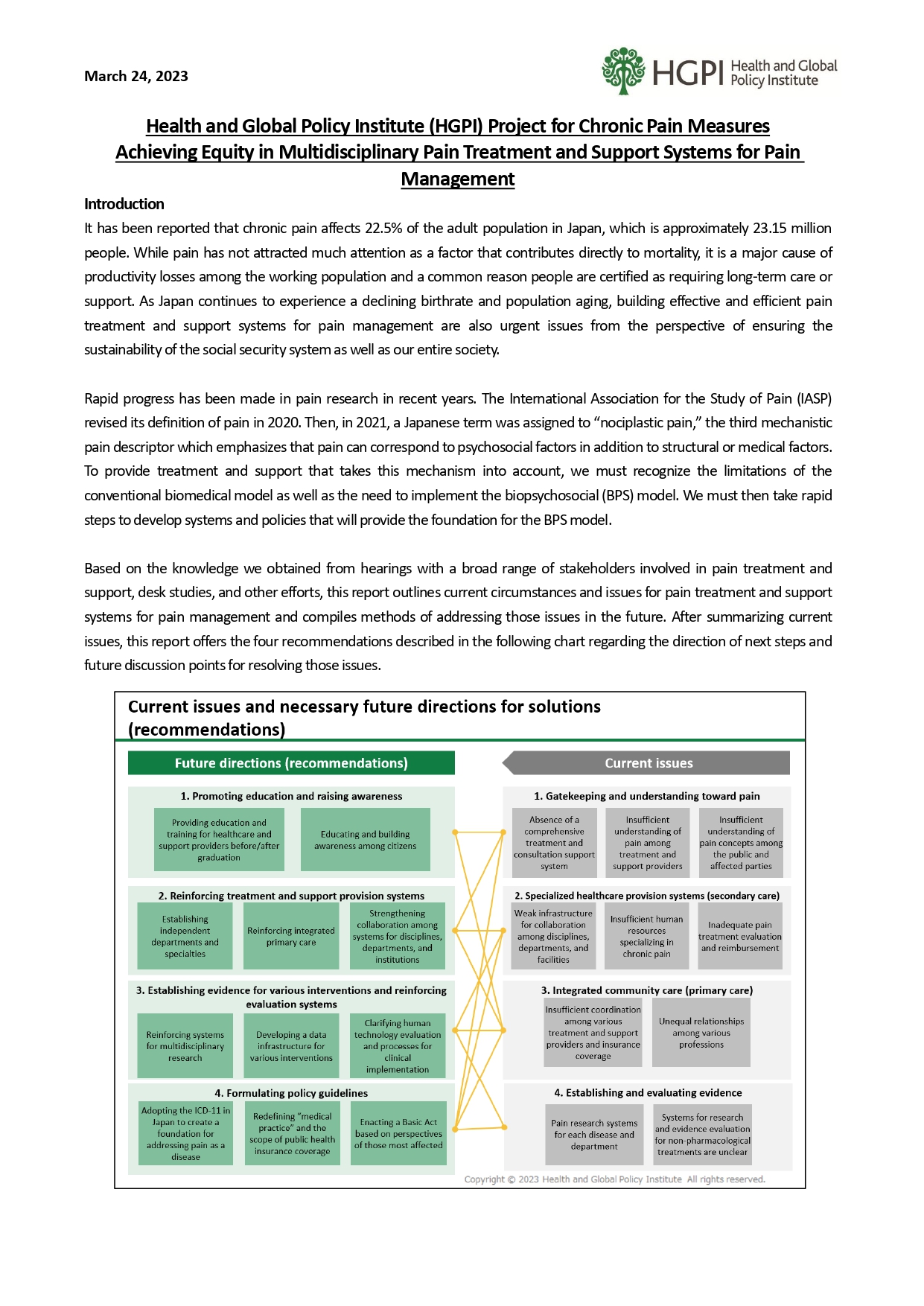
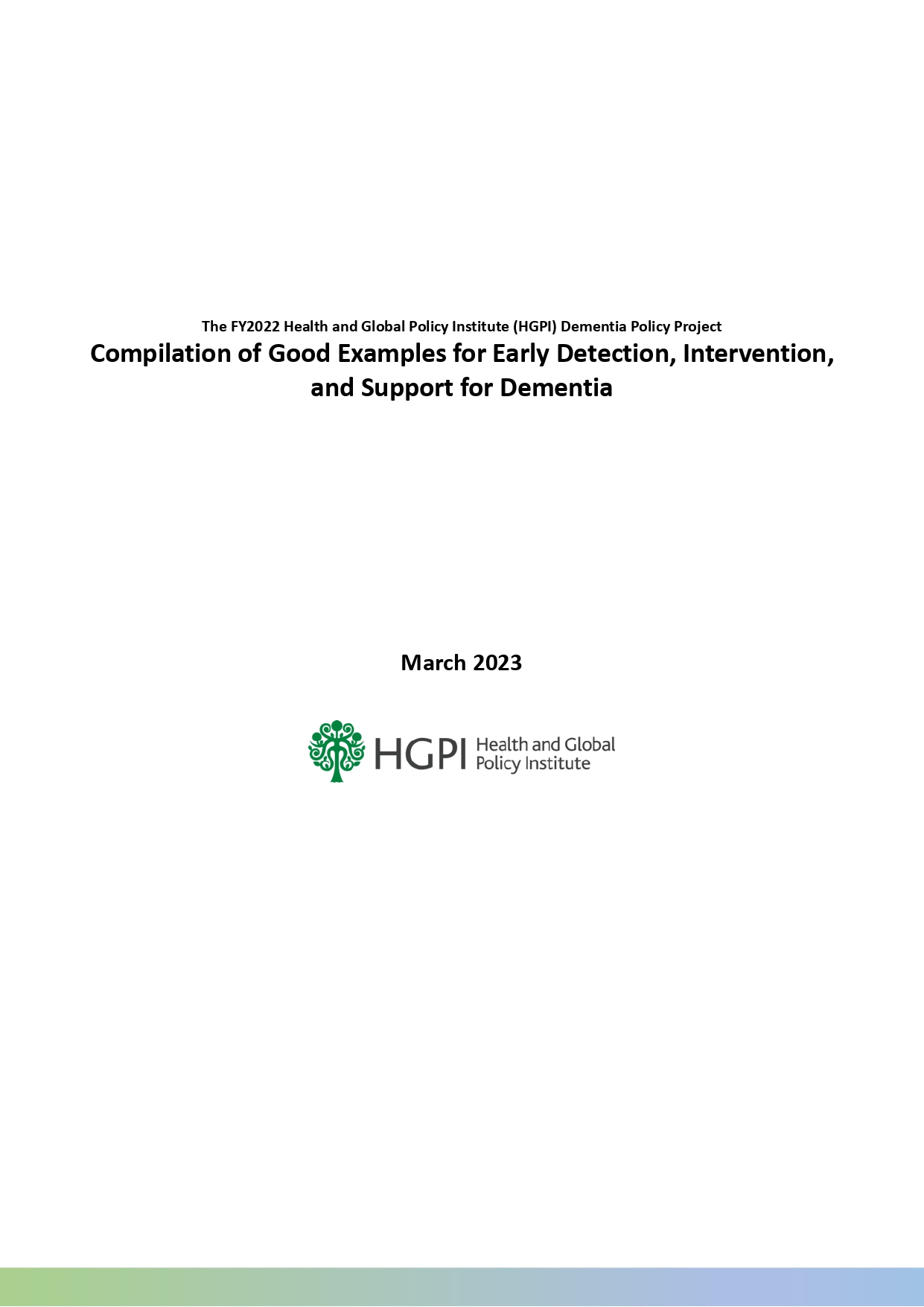
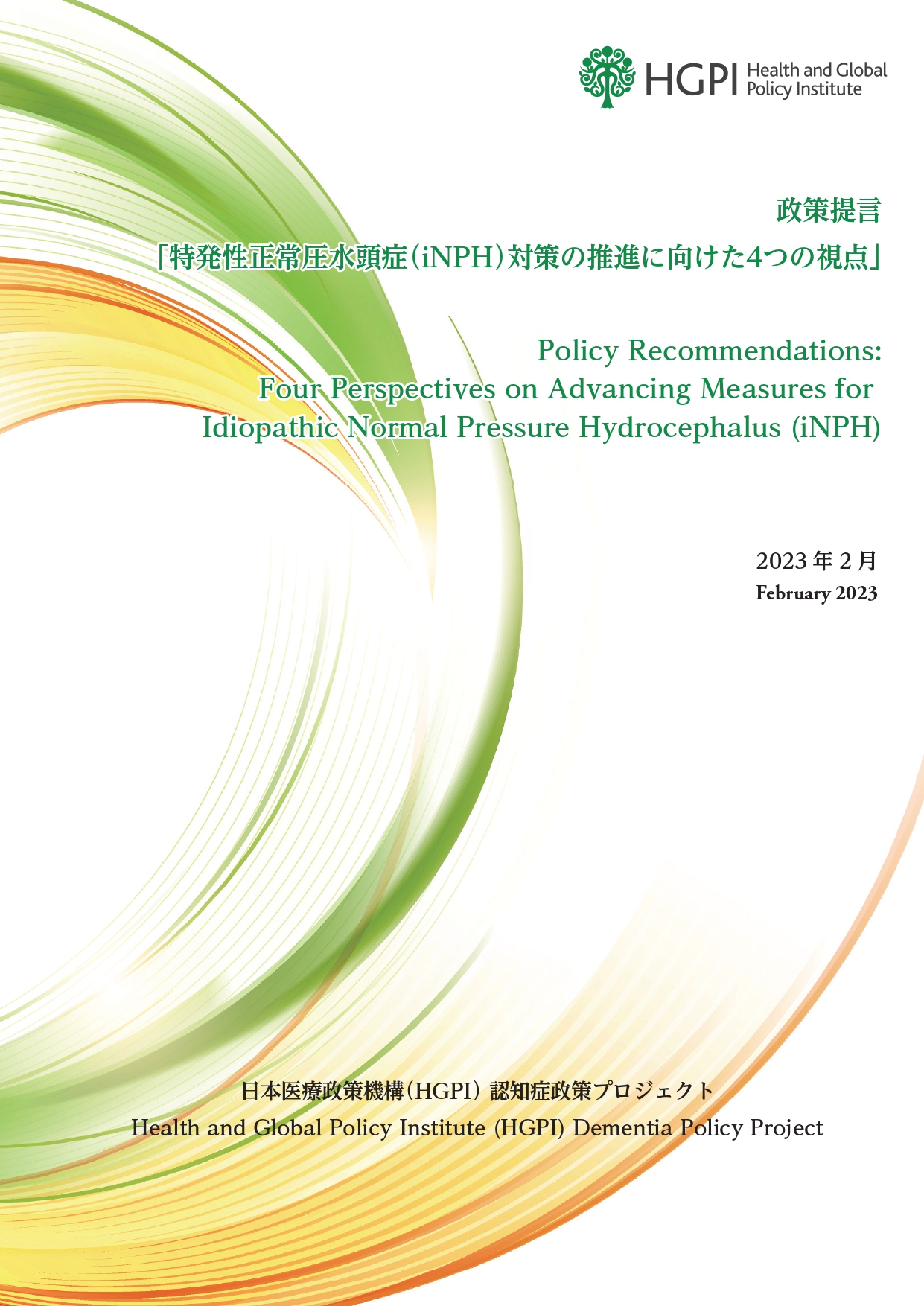
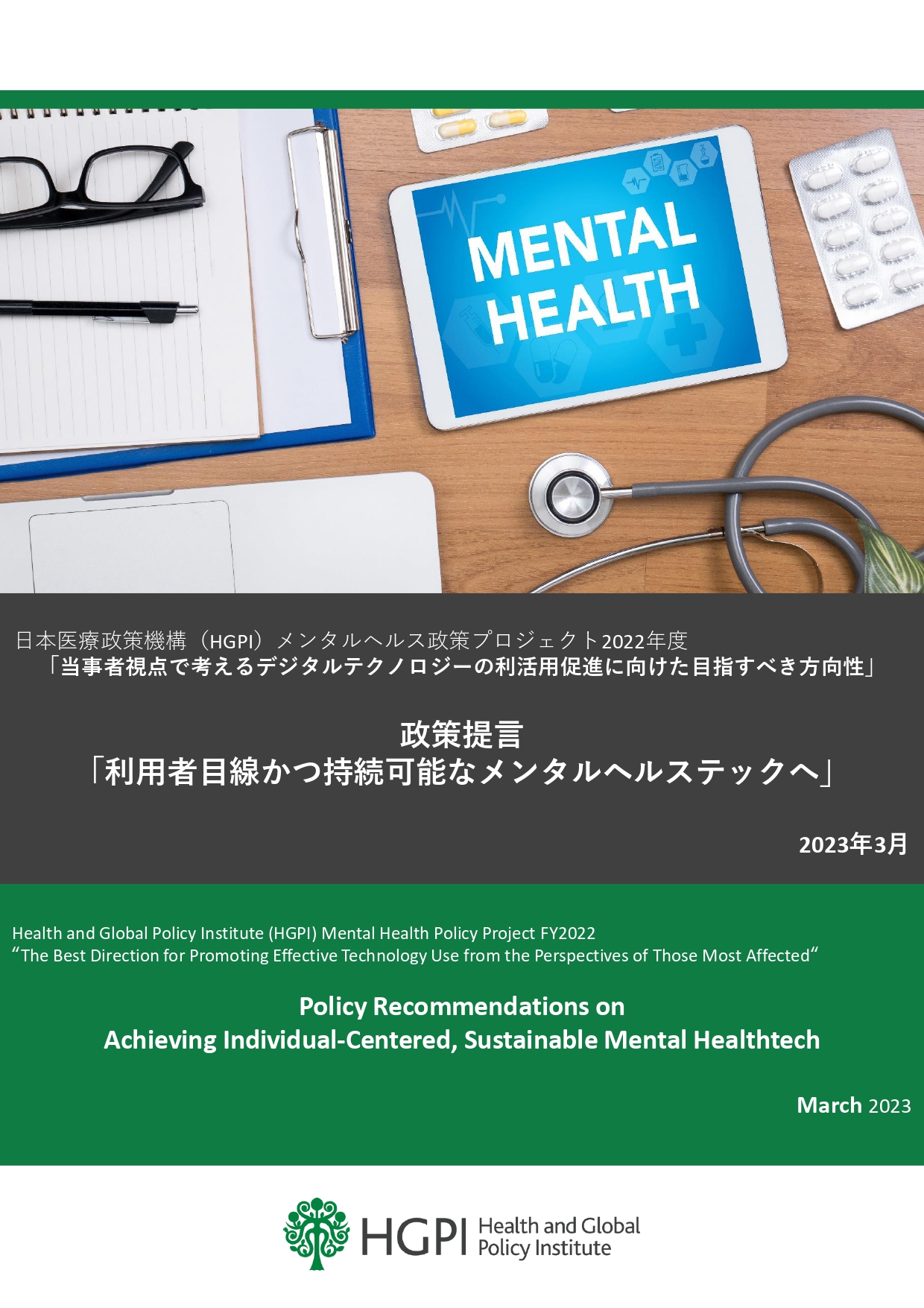

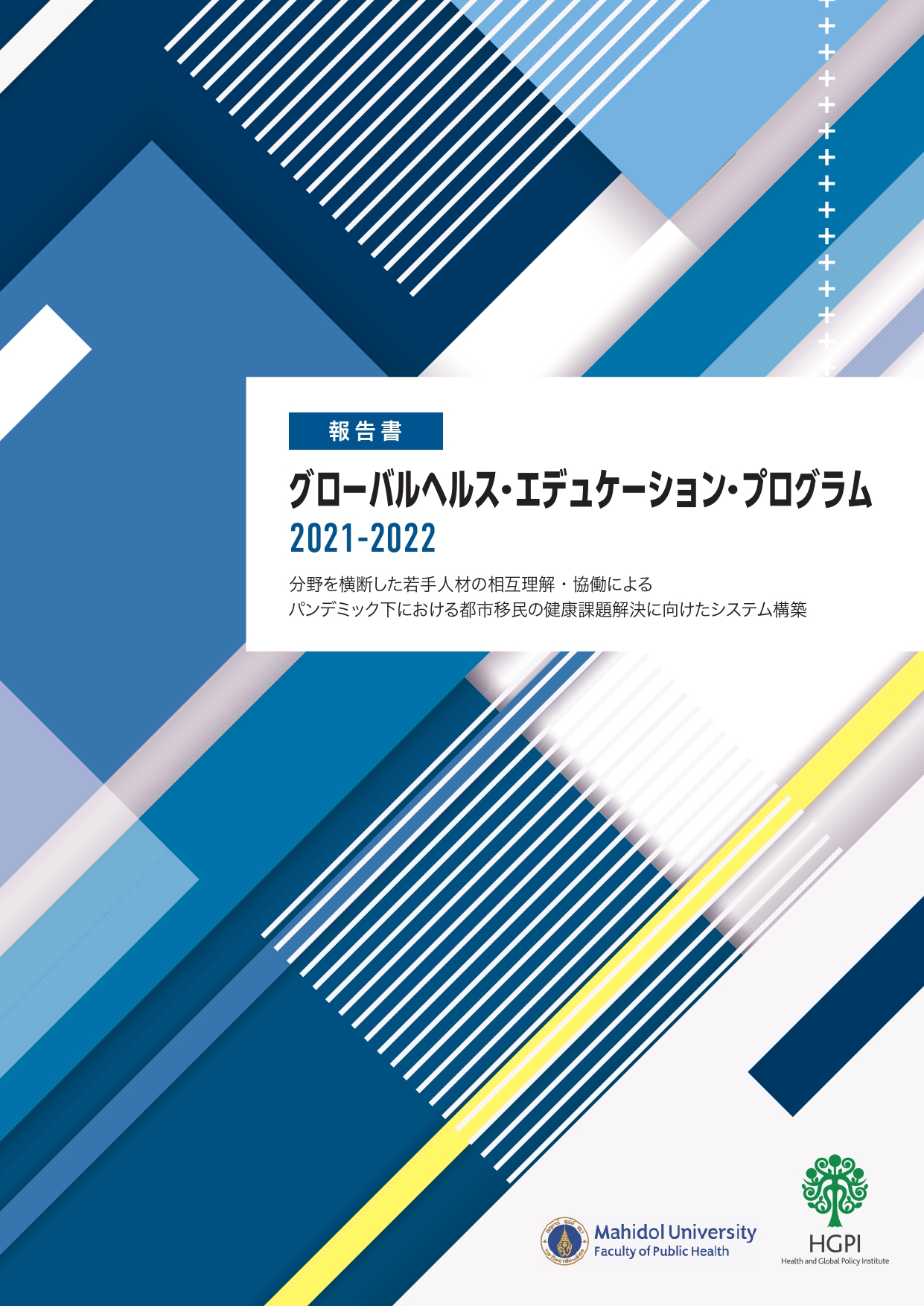
Providing Professional Expertise
Serving on Government Committees and Global Organizations
Senior members of HGPI have held various titles on government committees and in global health societies. Some of those titles are listed below.
- Kiyoshi Kurokawa: Member, World Dementia Council; Healthcare Policy Advisor, Cabinet Secretariat; Chairman, Council on the Future of Tokyo in a Super-Aged Society; Chairman, Cabinet Office’s AI Advisory Board
- Kohei Onozaki: Health Policy Advisor, Ministry of Health, Labour and Welfare; Social Security Team, Administrative Reform Conference, Cabinet Secretariat
- Ryozo Nagai: Member, Ministry of Health, Labour, and Welfare Social Security Council; Provisional Member, Council for Science and Technology, Ministry of Education, Culture, Sports, Science and Technology; Member, Cabinet Office’s AI Advisory Board
- Ryoji Noritake: Committee Member, Council on the Future of Tokyo in a Super-Aged Society
- Satoko Hotta: Member, Caregiver Fee Subcommittee and Welfare Division, Social Security Council, Ministry of Health, Labour and Welfare; Expert Committee Member, Policy Evaluation Council, Ministry of Internal Affairs and Communications
- Shinsuke Muto:Information Policy Advisor, Ministry of Health, Labour and Welfare



